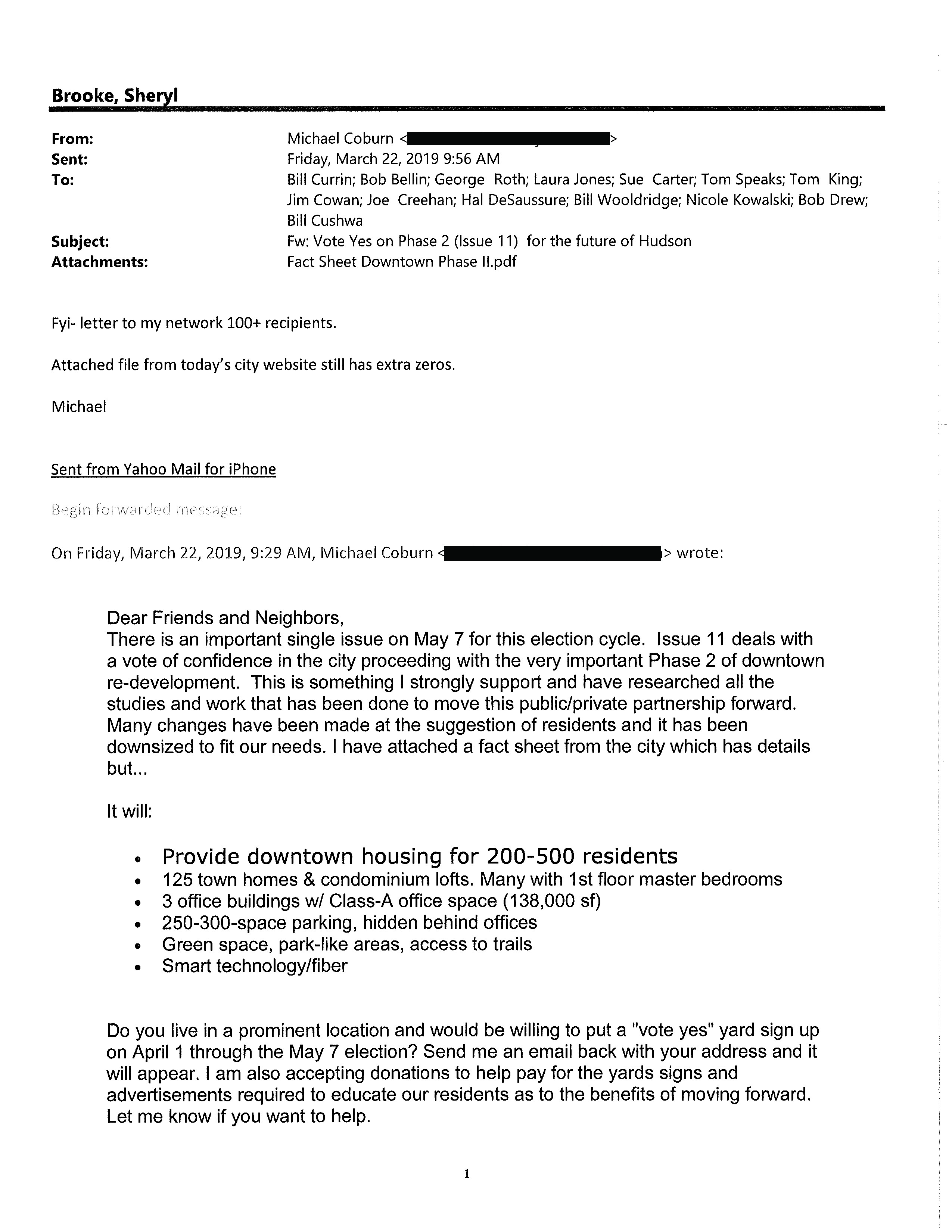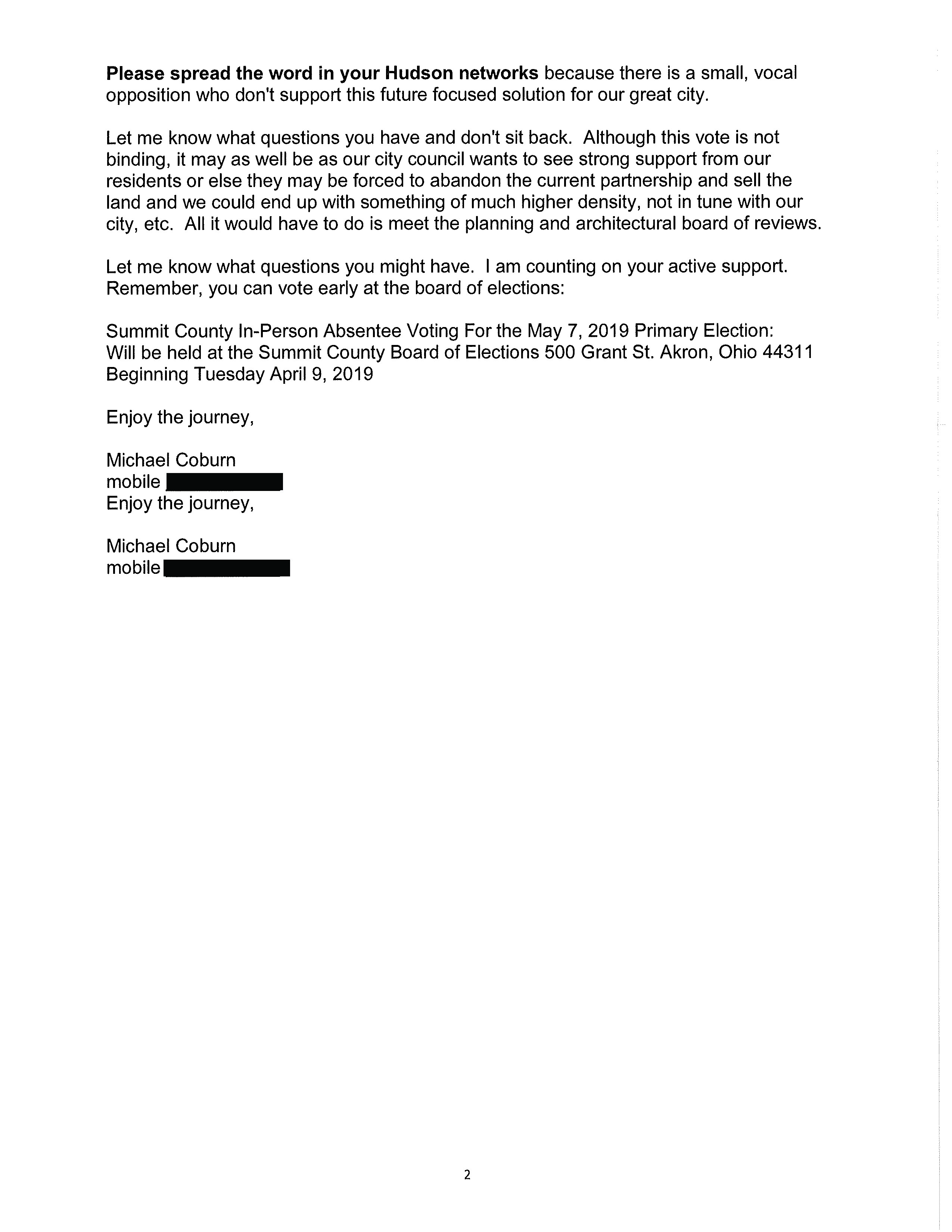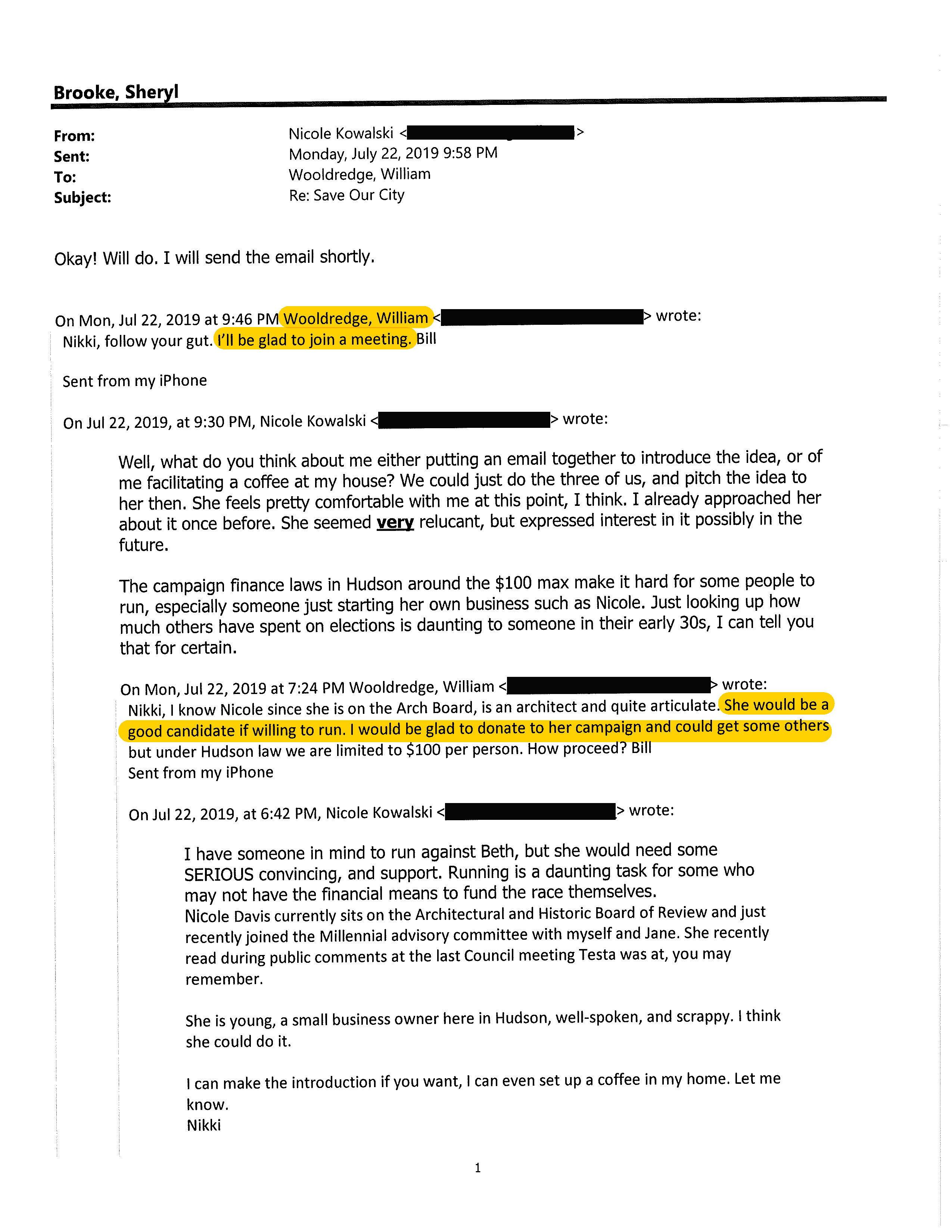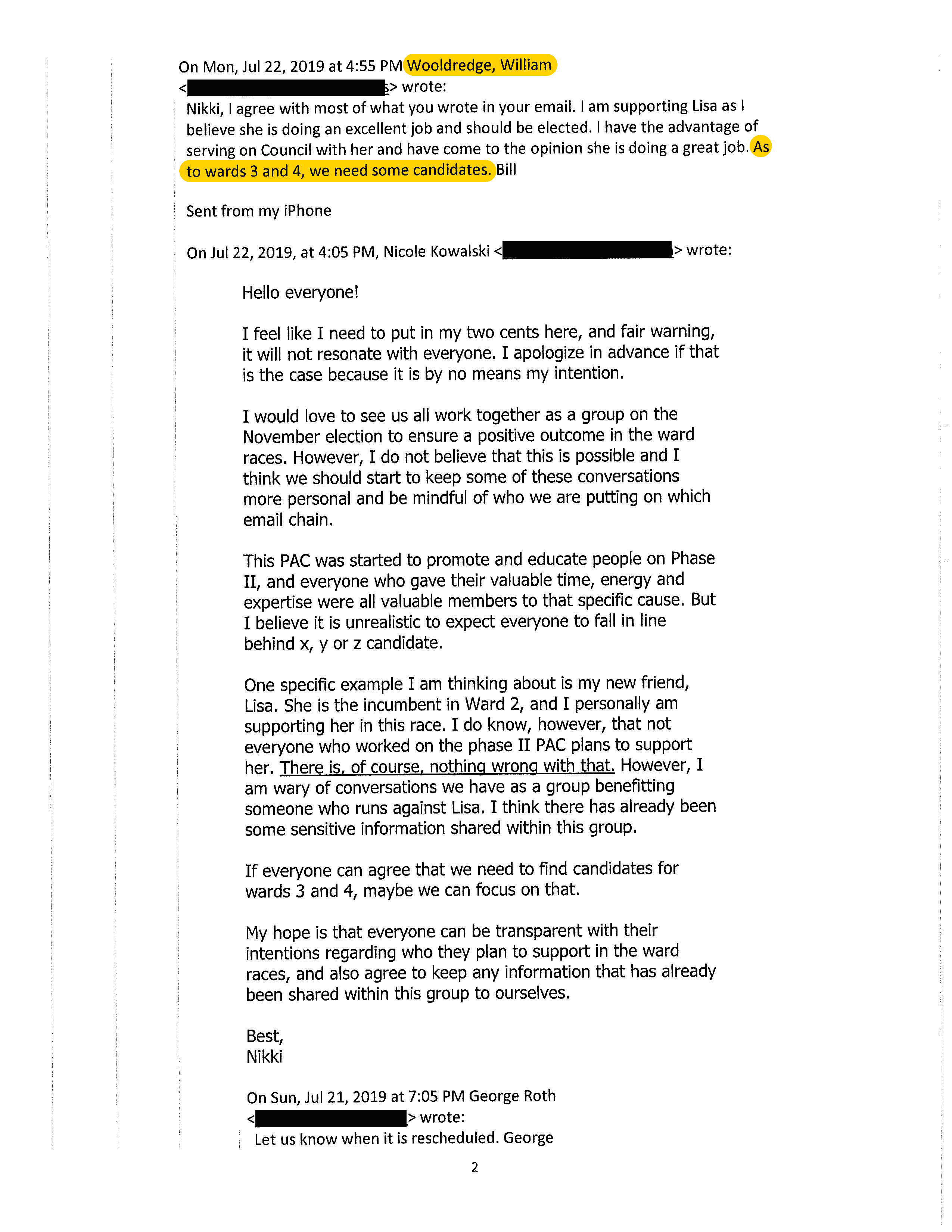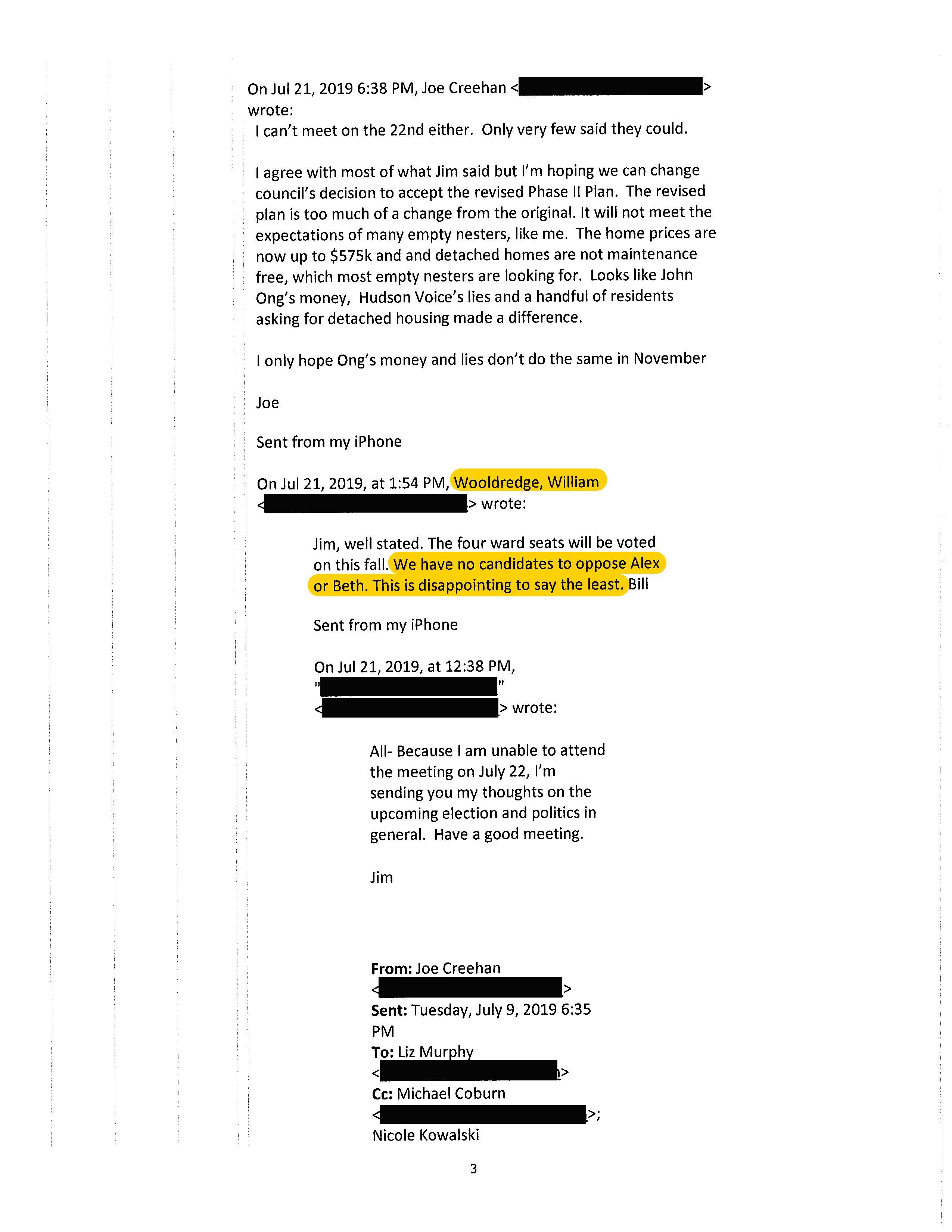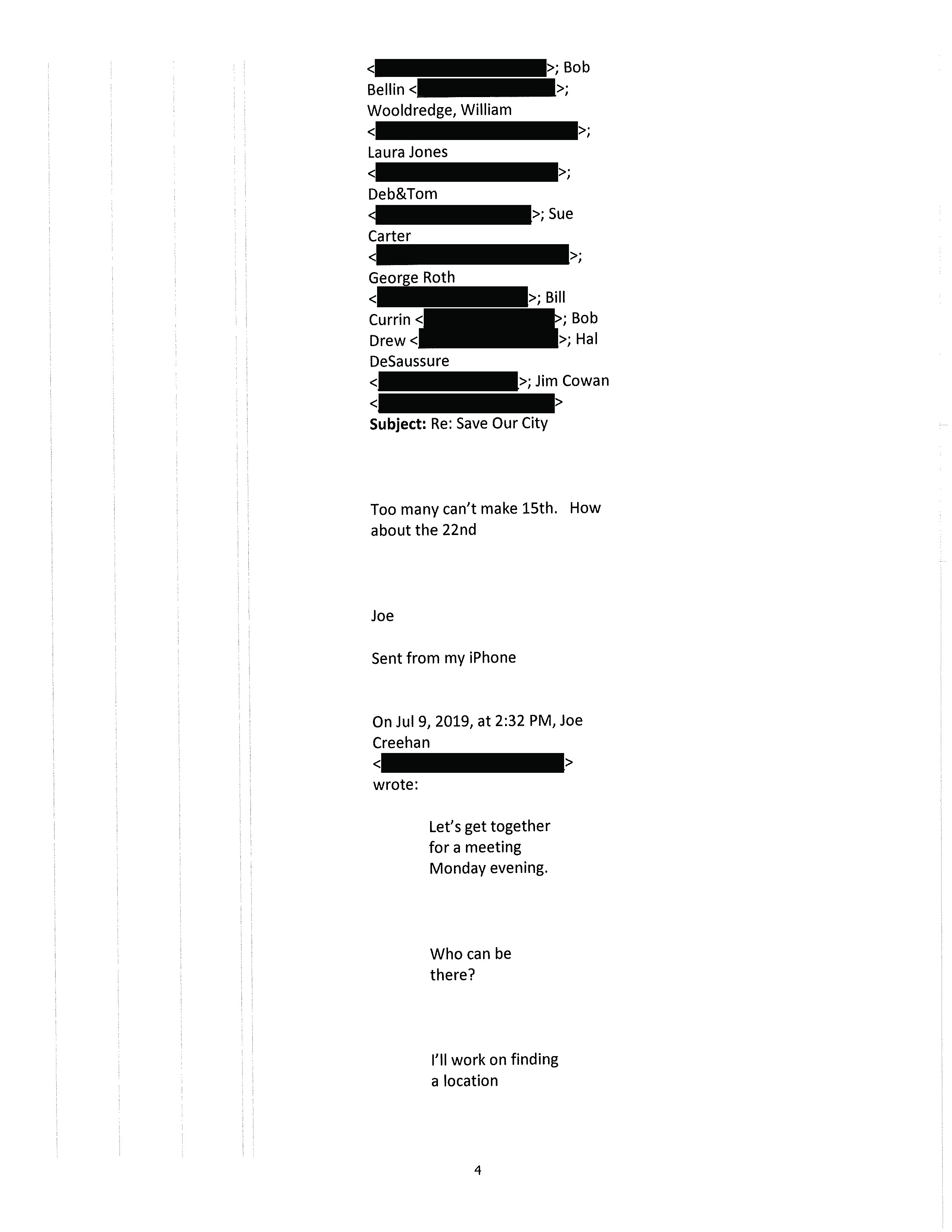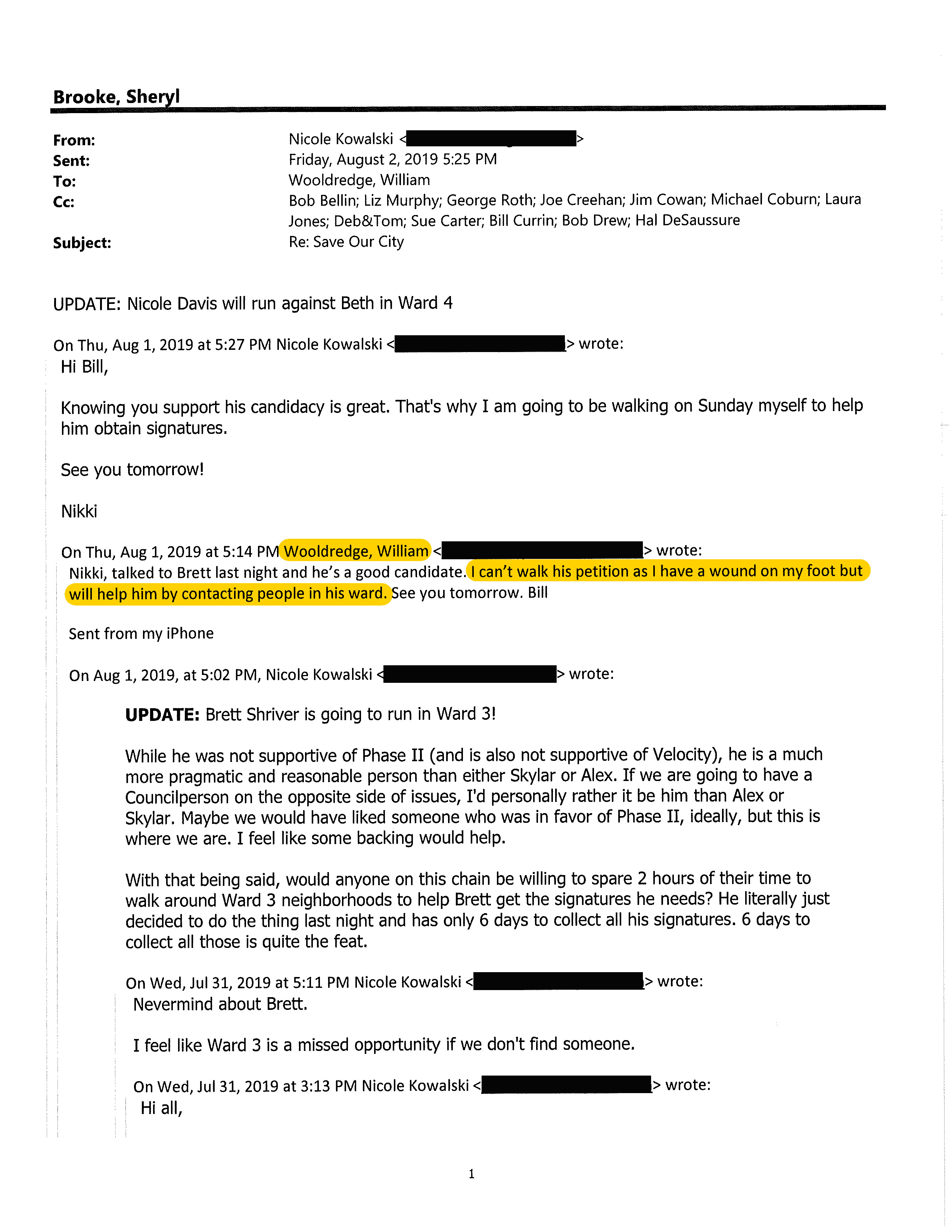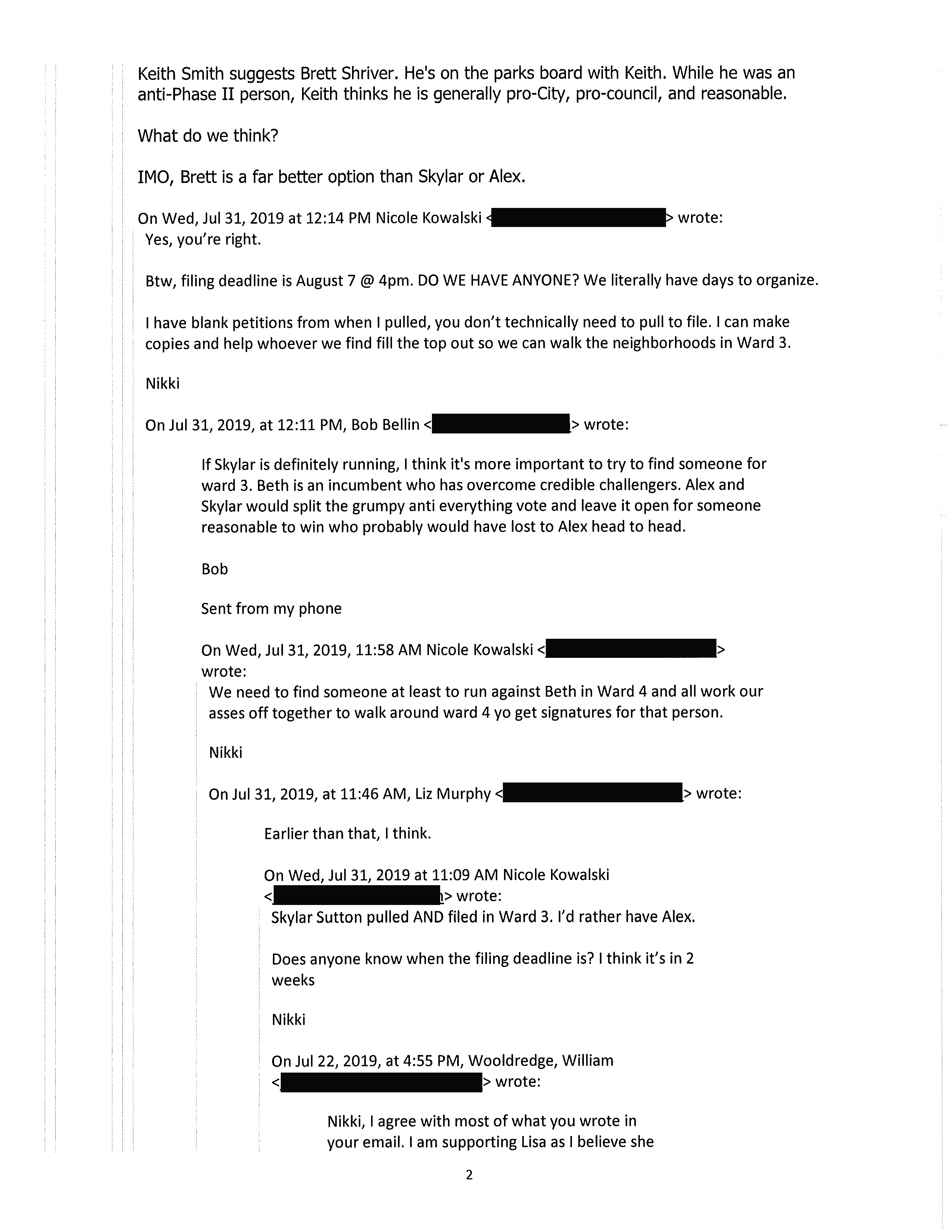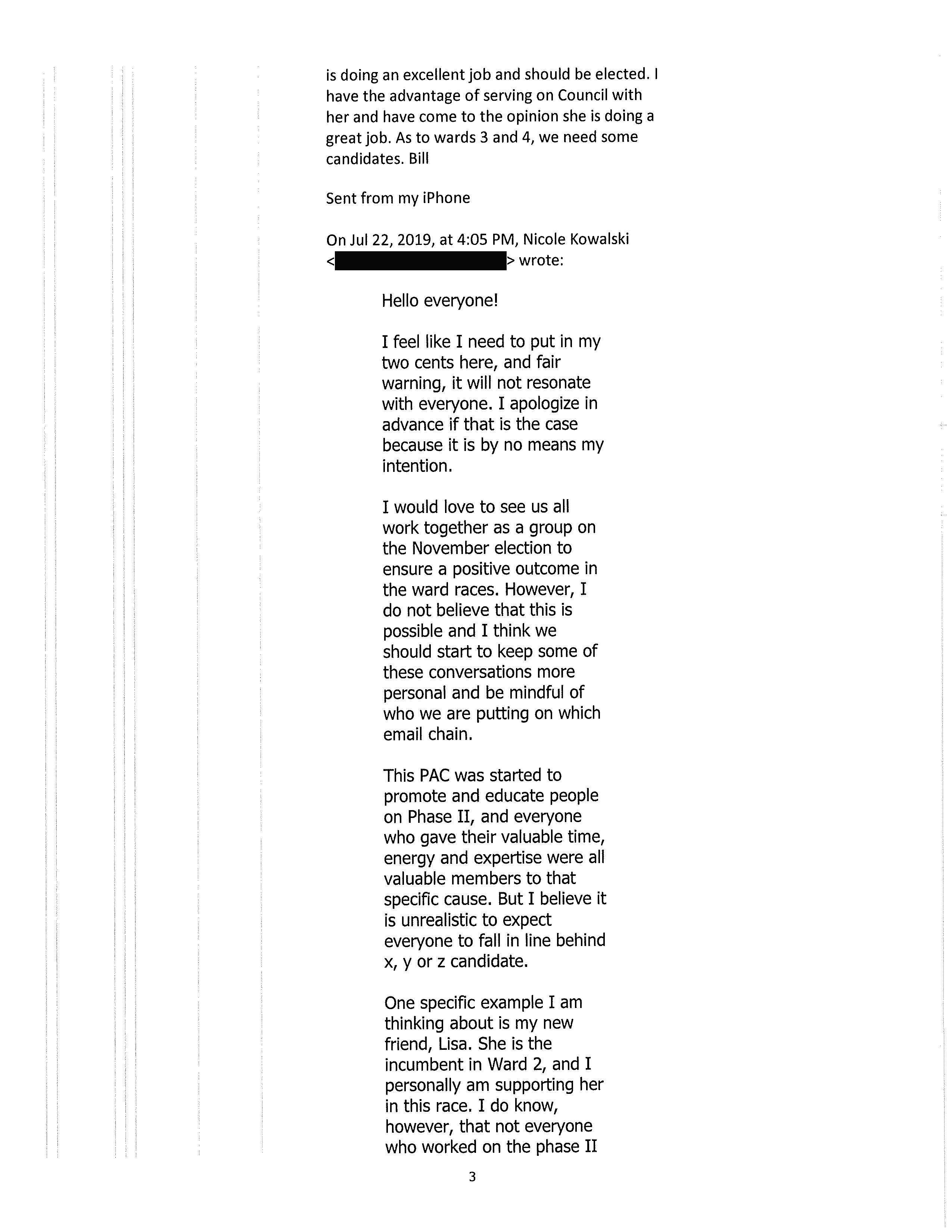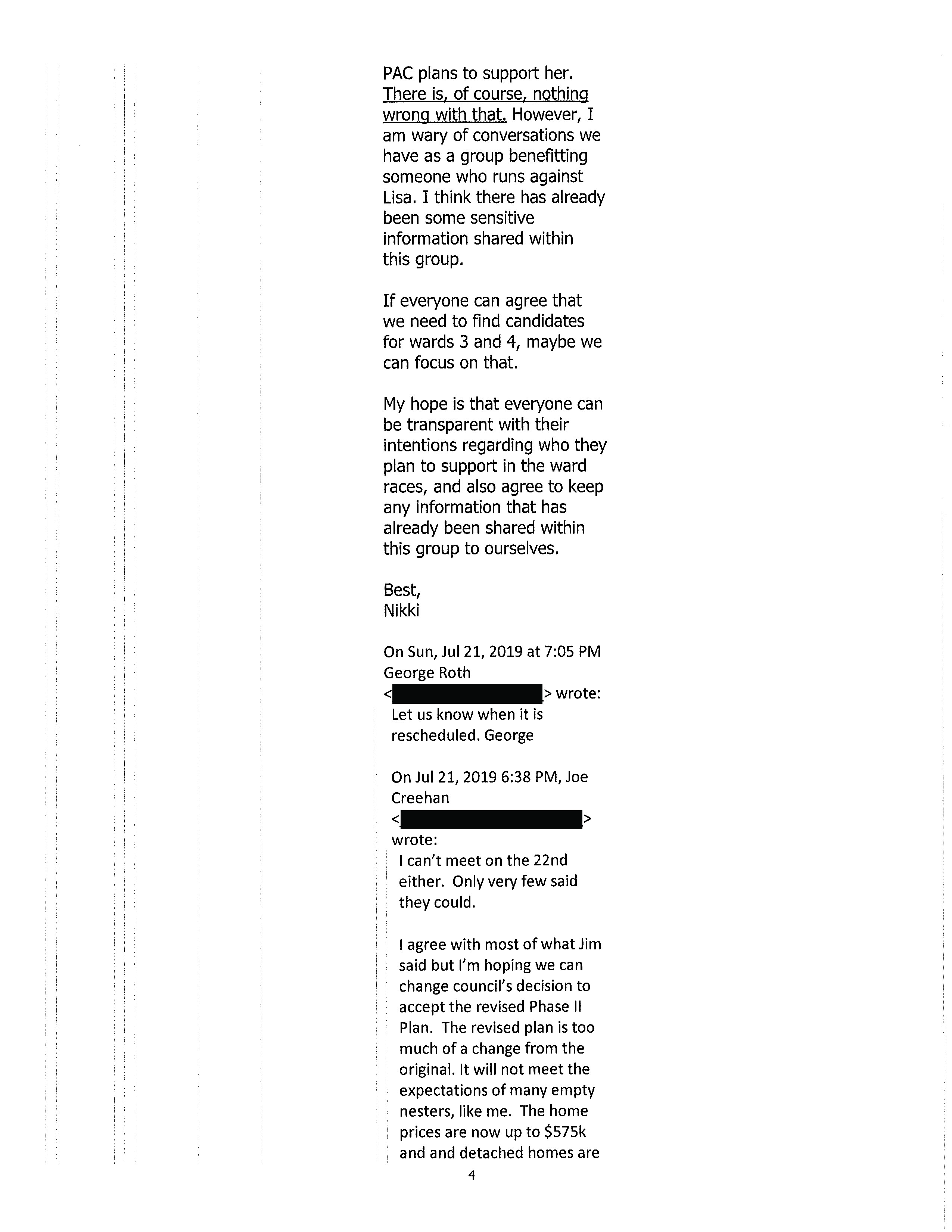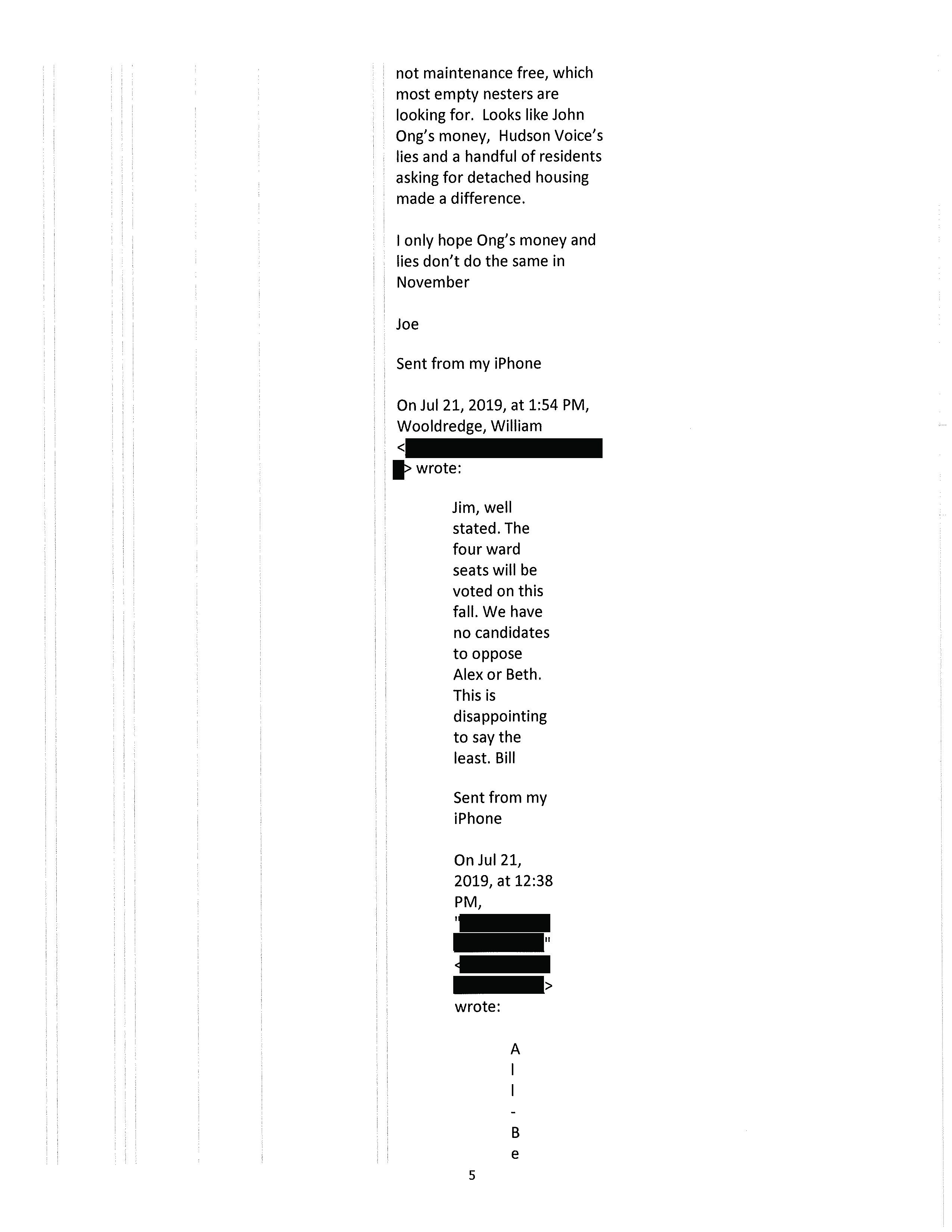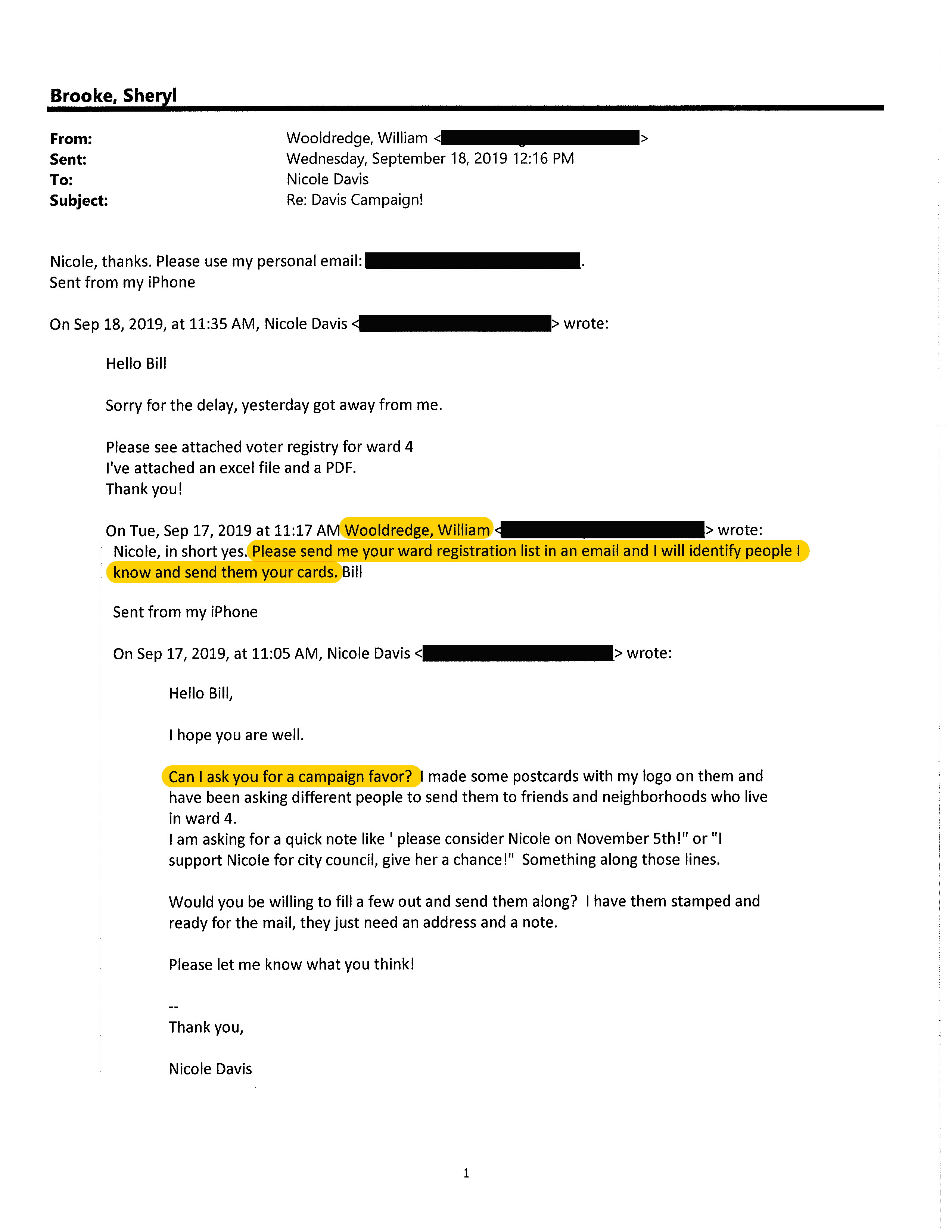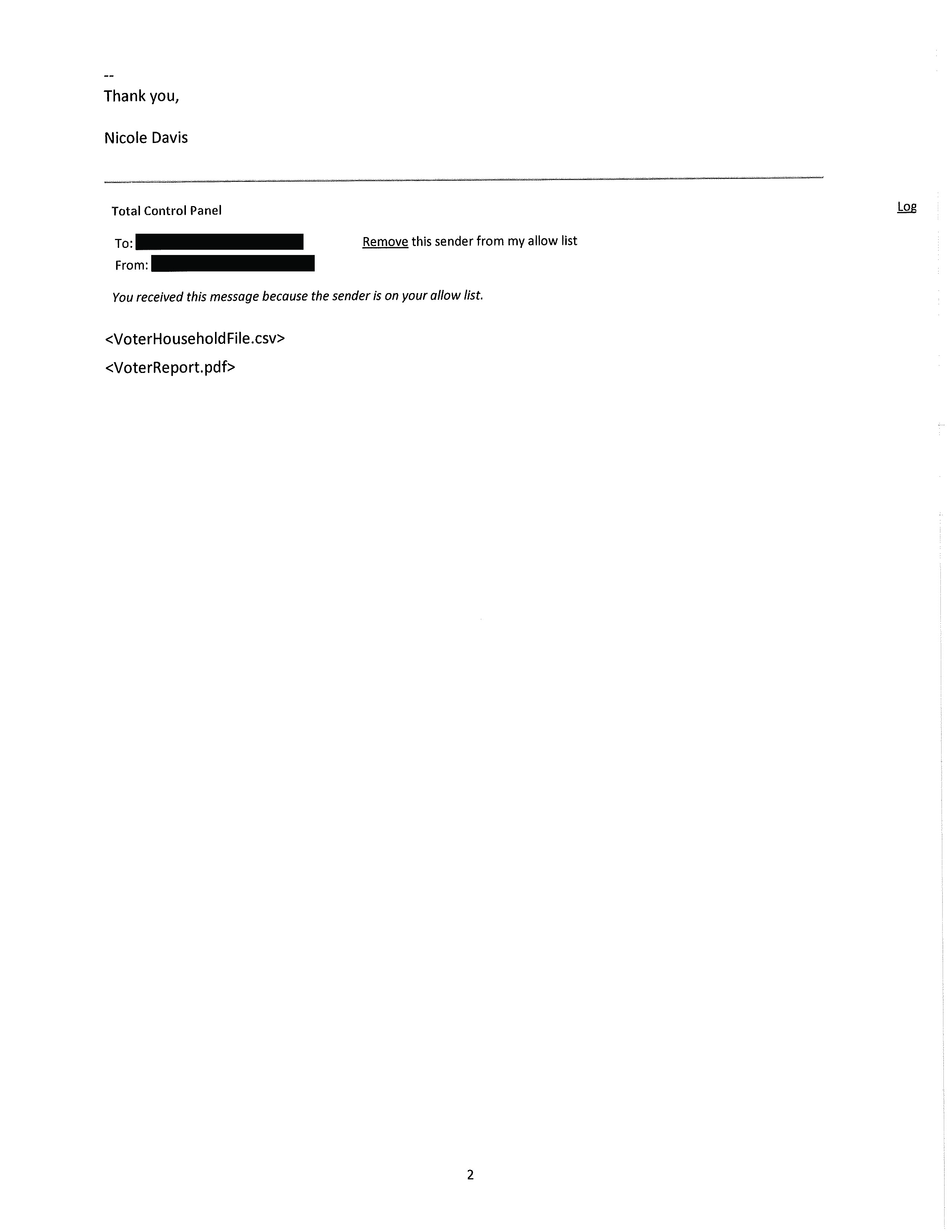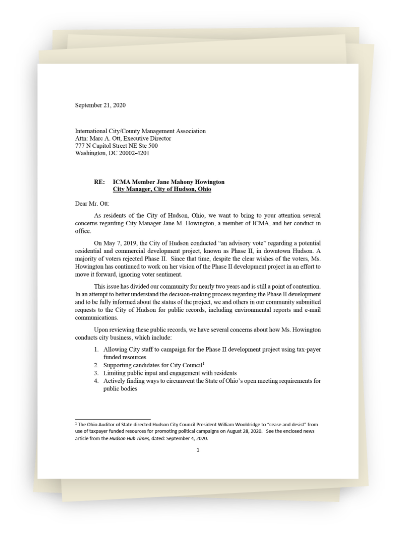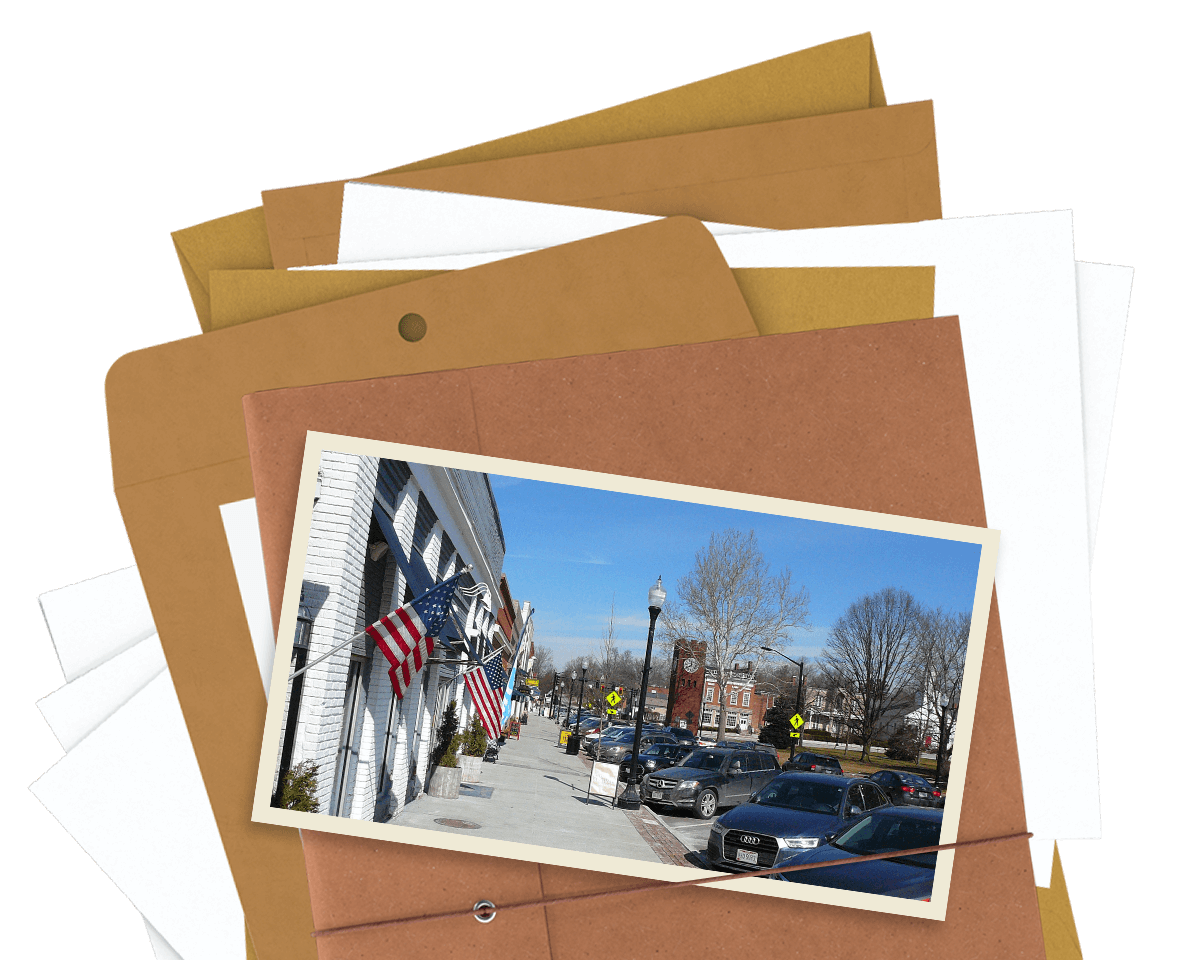
News & Updates
A growing number of Hudson residents are calling for more transparency and accountability in city government. They requested public records on a variety of matters from the City of Hudson, and what they’ve found is a pattern of behavior that is undermining the public’s trust. You can read these emails and reports, in their entirety, here.
20 Hudson Citizens Ask International City/County Management Association (ICMA) to Review Hudson City Manager Jane Howington’s Conduct
The Hudson Files Website, a resident-led project to increase transparency and public accountability in Hudson’s municipal government, has been cited by a group of 20 Hudson citizens as the source for documents that have now led to a complaint filed by the group against Hudson City Manager Jane Howington.
The complaint came to light in a story published on October 8, 2020 by the Hudson Hub Times, which reports that on September 21, 2020, the group filed a complaint with Howington’s professional association, the International City/County Management Association (ICMA), that alleges multiple ethical violations. The complaint documents the group’s concerns about Howington’s conduct in office with corroborating evidence in the form of emails and other public records, and requests an independent evaluation of her conduct. [Read the complaint here]
ICMA’s Code of Ethics requires members, including Ms. Howington, to abide by high standards for ethical behavior in office, including: demonstrating integrity, instilling public confidence, serving the best interests of the people, refraining from political activity and fostering effective communications with all citizens.
“This complaint is about Ms. Howington’s performance on the job and if she is living up to the standards of public service outlined in the ICMA Code of Ethics,” said Ed Stein, a signer of the complaint, in a prepared statement. “Unfortunately, we felt it necessary to take this step to ensure that any City Manager of Hudson operates in accordance with the city policies and high ethical standards such as those established by the ICMA.”
Stein stated this group of 20 Hudson citizens took the step of approaching ICMA for an independent evaluation only after City Council leadership and the City Solicitor failed to act on concerns that they first raised about Ms. Howington’s conduct almost a year ago.
“I previously developed a draft ICMA complaint focused on Ms. Howington’s perceived intrusion into ward elections last fall,” said Stein. “I submitted the complaint to City Council, met with then-Ward 2 representative Lisa Radigan regarding the matter, and discussed reviewing the allegations internally through appointment of an independent evaluator that would report back to City Council on the level of inappropriate behavior – if any”.
Ultimately, Council leadership and the City Administration refused to pursue the matter.
Since the time the initial complaint was submitted to City Council requesting an independent evaluation of the situation, more information came to light through public records requests released publicly on The Hudson Files that shed further light on Ms. Howington’s conduct and approach to managing the City. These records show Ms. Howington and members of her staff working to limit public input, skirting open meeting laws, repeatedly discussing political issues and election campaigns, supporting candidates, and using dismissive language towards other public officials, all while on the clock.
Similar concerns were shared by yet another Hudson resident in a letter to the editor in the Hudson Hub Times published on October 7, 2020.
Under the ICMA’s ethics complaint process, the Executive Director first will determine if the allegations made against Ms. Howington could be a potential violation of the Code of Ethics. Next, Howington would be notified of the complaint and have 30 days to respond in writing. By the end of those 30 days, ICMA would then undertake an investigation, which may last as long as six months.
Week 13 - The Path Forward for Hudson’s Downtown Phase II Development
Wooldredge, DeSaussure and Schlademan propose no-bid contract with developer; City would write off taxpayer investment of $16,400,000
As we shared with you last week, the Downtown Phase II Development project is still very much alive. On September 15, 2020, one week after Fairmount Properties presented its high-density row house redevelopment plans to Hudson City Council, At-Large Council Member Hal DeSaussure offered a motion to proceed with negotiations to sell the Downtown Phase II property to Fairmount Properties. during the “Correspondence and Council Comments” section of the City Council Workshop.


Source: Fairmount Properties
This motion was proposed, despite a lack of outreach by the City of Hudson to residents to seek feedback on the development plans. DeSaussure’s rush to proceed with the project, if successful, would have resulted in a no-bid contract to Fairmount to purchase valuable land at a steep discount, compared to the amount of tax-payer dollars already invested in the project.
What does this mean?
Fairmount’s proposal for Phase II was not the result of a competitive public bidding process. The City Council motion would have instructed the city to begin negotiations to sell the land to Fairmount. According to Fairmount’s presentation to City Council on September 8, 2020, the most Fairmount Properties would pay for the Phase II site is only $2 million. Randy Ruttenberg of Fairmount Properties said:
What we would like to propose is that we take this down in phases. So, we could pay somewhere around $1.8 million for Phase 1. That’s based on a $5M site work number. And again, if the site work number becomes a little less, then we can pay a little more. And we would do this on an open book basis. We envision somewhere between $1.5 and $2 million for Phase 1 plus we would agree to purchase the Windstream building, which I think is – we spoke to the folks at Windstream and I have heard prices between $1 million and $1.3 million, but we would be prepared to spend somewhere -- you know in the $1.5 million to $2 million plus another million - - as much as $2.5 to $2.8 million to be able to start this project, control the Windstream building. We would propose that we convert that Windstream building into a sales center….”
You can view the video of the presentation here.
At no more than $2 million, the City would be giving Fairmount a sweetheart deal, as Hudson taxpayers have already invested $18,421,060 in Downtown Phase II development since 2016, according to Ohio Checkbook. This means that, if the land does indeed sell for $2 million, $16.4 million of tax-payer investment in the project will be written off.

Source: www.checkbook.ohio.gov
Furthermore, the issue of environmental contamination at the site still needs to be addressed. Has the City asked Fairmount for a commitment to clean up the environmental contamination on the Phase II site to OEPA Voluntary Action Program standards and protect Brandywine Creek, at the developer’s expense? At the bargain price being proposed by Fairmount Properties, the environmental cleanup should not be an additional burden to taxpayers.
We also have to ask, what due diligence has City Council done to determine if Fairmount Properties has the financial capability to complete this development, including the necessary environmental clean-up and infrastructure. Does the City have verification of Fairmount’s equity and construction financing in writing? This is a valid concern given that, “The pandemic has put lifestyle and mixed-use properties such as Pinecrest in a unique position in the suffering shopping center world”, as reported in the Crain’s Cleveland Business article, Notable Northeast Ohio shopping centers are feeling the pinch of pandemic-induced pain.
Finally, the public needs to understand how many more of our hard-earned tax dollars will be spent on the project over and above the $18,421,060 already invested – for things like roads, traffic improvements, water and sanitary sewer lines, and storm water controls that are vital to protecting Brandywine Creek.
These questions – and many more – must be answered before the City attempts to negotiate any additional deals regarding Downtown Phase II. Council persons Wooldredge, DeSaussure and Schlademan voted to proceed with negotiations on the bargain-priced no-bid arrangement with Fairmount.
Thankfully, three council members, Beth Bigham, Chris Foster and Skylar Sutton, voted no on DeSaussure’s September 15 motion – in other words, they favor working with the people of Hudson to understand the citizens’ views regarding what, if anything, should be built as part of the Downtown Phase II project. You can read the Hudson Hub Times’ coverage of the vote here.
The Path Forward
During the September 22, 2020 City Council Workshop, City Council discussed if and how they should proceed with Downtown Phase II. After a lengthy conversation, it was agreed upon that each council member would develop an approach to engaging the community on Phase II. City Council expects to discuss it again at the October 13 meeting.
We suggest that a positive, inclusive approach to achieving community-wide consensus on the Downtown Phase II development could include the following elements:
- First, identify, through an open and transparent process of civic engagement under the guidance of a skilled and neutral facilitator, what the community values most about our town. For instance, what are the characteristics that draw us to Hudson – that make Hudson, Hudson.
- Second, hire an award-winning design architect who can, in collaboration with the community, develop a plan that brings life to the key values that the citizens have articulated. This will help ensure that the values the community shares are reflected in the uses, design, density and landscape of the Phase II site.
- Third, place this jointly-developed plan before the voters for final approval in a city-wide referendum.
This is fundamentally the process that was followed with respect to the development of Phase I in the 1990s. It worked well for the community then, and it can work well for us again in charting the course forward for Phase II.
We urge the citizens of Hudson to get involved in this process and make your voices heard. That is the only way to preserve the historic charm and friendly, small-town atmosphere that is the reason why we all moved here, and the reason why Hudson continues to thrive.
Click here to watch the Council debate over moving forward with new Phase II negotiations.
November 3 Election May Well Decide the Fate of Phase II Development Project
New plan proposes Pinecrest-like high density development for Hudson
After the defeat of the Downtown Phase II plan at the polls in May 2019 and the defeat of four out of five pro-Phase II candidates in last November’s election, Phase II is back on the table, this time with a plan that presents more density and more traffic than the plan that voters turned down last year.
On September 16, 2020, the Hudson Hub Times reported that a new plan, created by the developer of Pinecrest in Orange Village, was presented to City Council on September 8. The plan includes 128 two- and three-story row-style townhomes, 140 apartments, an office building and a parking garage on the land earmarked for Phase II. You can read the story here. These plans in many respects mirror the high-density vertical development at Pinecrest, pictured below.

Pinecrest Development, Photo Courtesy of Cleveland.com
Upon review of the video footage of the September 16, 2020 City Council meeting, it is clear that City Council is currently split on the matter. That day, the vote by City Council on a resolution to sell land to the developer resulted in a 3-3 standoff, effectively hitting the pause button on the process.
However, this November, Hudson voters will elect a new council member. If a pro-Phase II candidate wins, a new vote could be taken regarding sale of the Phase II site to the developer currently trying to purchase the property, and Phase II may become a reality as early as December. For those disturbed by the continued advance of the Phase II development by Council President Bill Wooldredge and City Manager Jane Howington despite clear indications that residents do not favor the plans presented so far, this November’s election could be the difference between developing a consensus plan based on what we truly want and value as a community, and letting the current plan go forward.
Resident input against Phase II has been dismissed in the past by those currently in power at City Hall. One Hudson resident shared these thoughts in a Letter to the Editor which appeared in the Hudson Hub Times on September 16, 2020, stating that at City Hall, and in particular with City Manager Jane Howington, “citizen input and constructive criticism is frowned upon. Citizens must stay out of the way of the city manager and accept her singular agenda.”
We all want to ensure that the Hudson we know and love for its historic charm and friendly, small-town atmosphere continues to thrive. The best way for all residents to help shape our community’s future is to once again make their voices heard in this November’s election.
Click Here to Read the Mayor's Corner Article
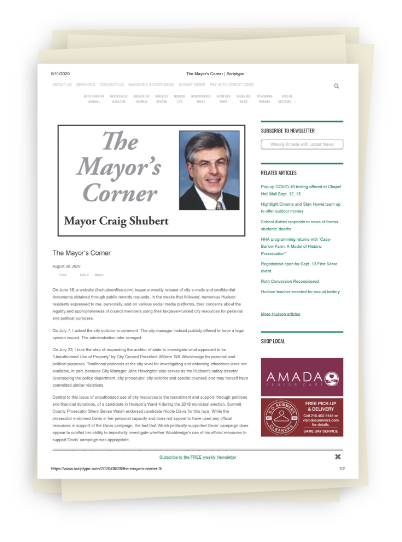
Click Here to Read the Story About the Auditor's Response
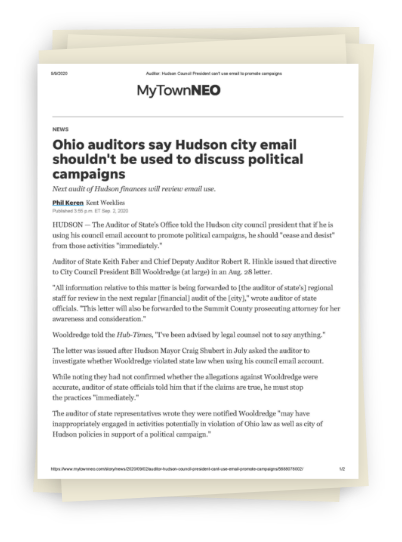
State Auditor tells Council President Bill Wooldredge to “cease and desist” use of taxpayer funded resources for campaigns, according to Hudson Hub Times
The Hudson Files website, a resident-led project to increase transparency and public accountability in Hudson’s municipal government, has been cited by the news media as the source for documents that have no led to the issuance of a “cease and desist” order issued to Hudson City Council President Bill Wooldredge by the Ohio Auditor of State.
The story, published on September 2, 2020 by the Hudson Hub Times and provided in full below, reports that on August 28, 2020, the Ohio Auditor of State directed Wooldredge to “cease and desist” from use of taxpayer funded resources for promoting political campaigns. The story furthers states that Wooldredge told the Hudson Hub Times, “I have been advised by legal counsel not to say anything.”
The matter arose out of a complaint filed with the Auditor by Hudson Mayor Craig Shubert after numerous Hudson residents read various public records published on The Hudson Files website, and then expressed concerns to him about the “legality and appropriateness” of Wooldredge’s use of taxpayer-funded resources for personal and political purposes. At a public meeting on July 7, Hudson City Manager Jane Howington offered to obtain a legal opinion on the subject but later reneged. Shubert then contacted the Auditor. Mayor Shubert explained the reasons for his actions in a recent “Mayor’s Corner" published in Hudson Life September 2020, also reproduced below in full.
The Hudson Files is sponsored by the Hudson Community Coalition, a community partnership between two local grassroots organizations – the Hudson Environmental Council, LLC and Hudson’s Voice, LLC.
Read this week's press release from the Hudson Files
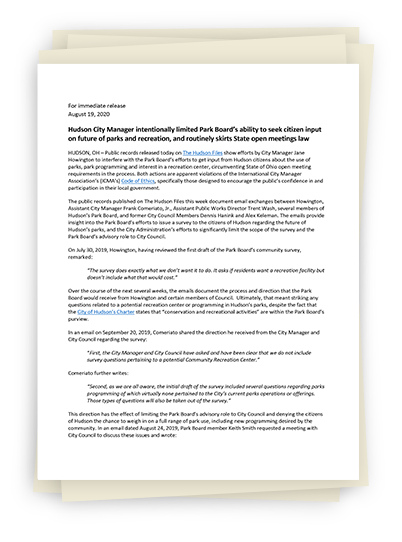
Howington states that the Park Board’s draft survey “does exactly what we don't want it to do," regarding a recreation facility.
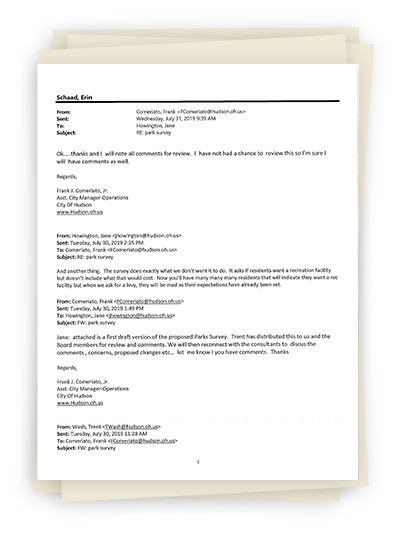
Howington states that the rec center will "be its own issue without clouding the park master plan."
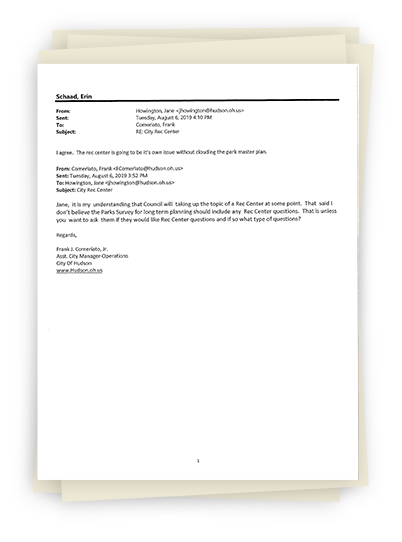
Assistant City Manager Comeriato tells the Park Board to remove questions about a rec center and park programming at the direction of the City Manager and City Council
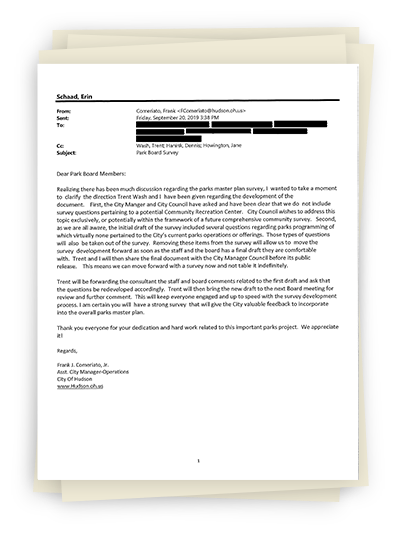
Park board members express frustration that the Board is being 'handcuffed' and that Council is not listening to the advice of the Board.
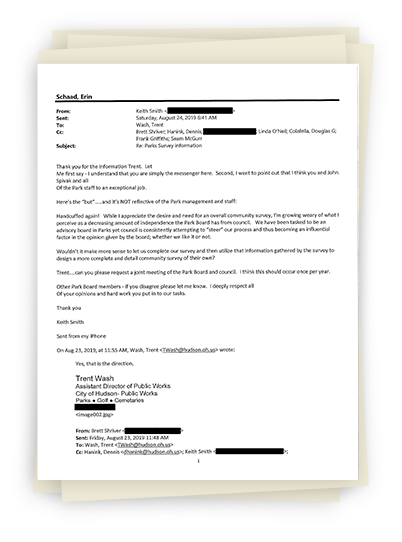
Park board members discuss value of getting citizen input on recreation center and programming, seek meeting with City Council after being directed to remove questions from the survey
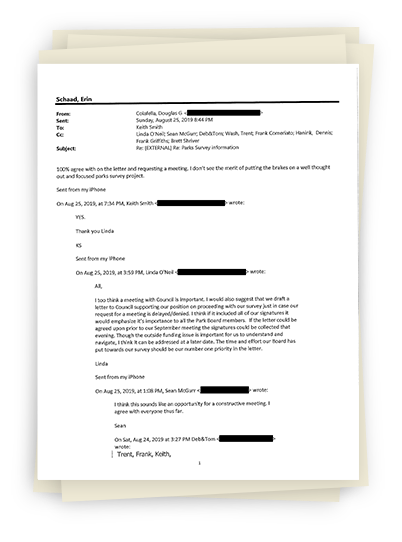
City Manager Jane Howington states that it was Council Member Dan Williams’ and Council President Bill Wooldredge's suggestion to wait and have one comprehensive survey go out.
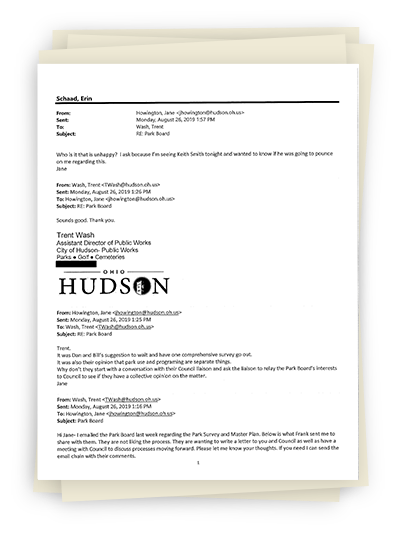
Former Council Member Kelemen states that “it was the cabal setting the direction” for the Park Board survey
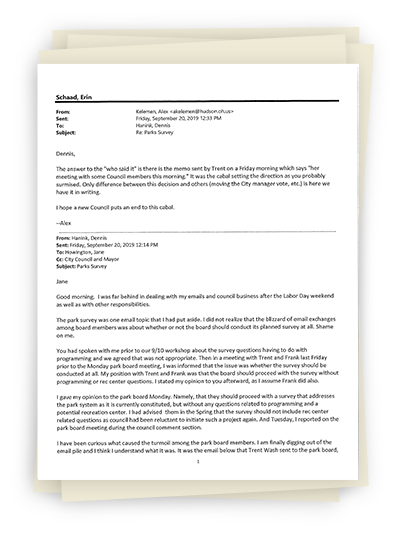
City Manager Howington indicates that she schedules the Friday morning meetings to set Council’s agenda, preferring to limit attendance so she can avoid a quorum
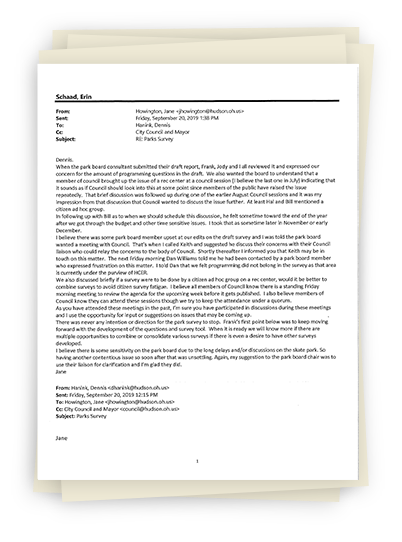
Former Councilmembers Hanink and Kelemen discuss the "interesting quiet from council members involved," regarding the Park Board survey.
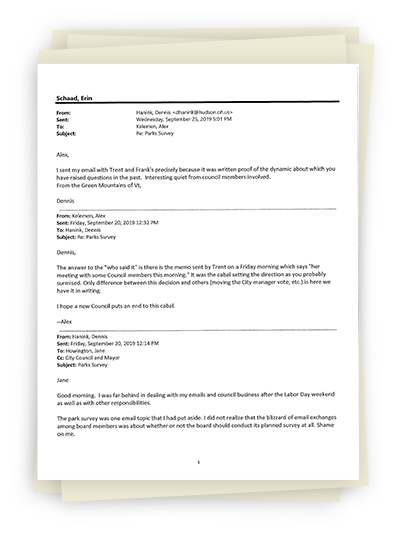
City's crisis communications firm develops anti-Recreation Center talking points in June 2019.
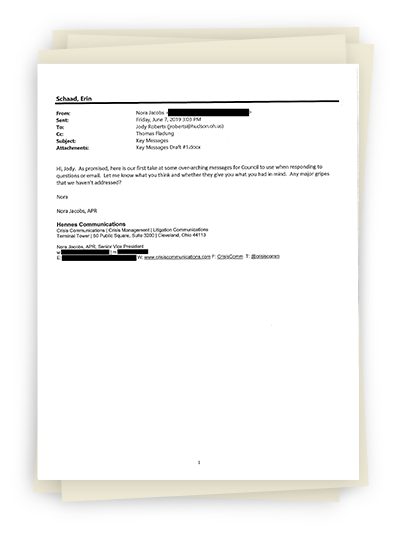
Week 10 – Hudson City Manager Jane Howington spiked Park Board’s survey on park programming and potential community recreation center, routinely skirts State open meeting law
This week, The Hudson Files is publishing emails received from the City of Hudson that show how City Manager Jane Howington, Council President Bill Wooldredge and former Council Member Dan Williams worked to thwart the Park Board’s efforts to seek residents’ input about park programming and potential recreation center, even though they were tasked by City Council to conduct the survey. According to the emails, Howington and City Council directed the Park Board to remove questions from the survey about park programing and a potential recreation center. When the Park Board requested a meeting with City Council to discuss the matter, they were instead directed to talk to their Council Liaison. Members of the Park Board felt their recommendations were summarily dismissed and felt “handcuffed” in trying to do their job.
While the emails released this week show that City Council stated they would conduct a separate survey regarding a recreation center, to date the City Manager and City Council have taken no action to survey residents about a potential recreation center. Previously released public records here on The Hudson Files include talking points designed to dissuade residents from seeking a recreation center, particularly on the Phase II development site.
These records also show that routinely meets with a small group of City Council members weekly to discuss the City matters, including the Park Board’s community survey. These closed-door sessions are kept small to, as Howington put it, “avoid a quorum”, which would trigger requirements for the meeting to be open to the public.
Week 9 – Hudson Hub Times article
The August 6, 2020 Hudson Hub Times story, Officials revisit Hudson mayor’s complaint to state auditor’s office, provides an updated look at the serious questions raised by the filing of a complaint with the State Auditor’s office regarding the use of tax-payer funded resources by Council President Bill Wooldredge, City Manager Jane Howington and city staff to conduct political activity. The complaint and news coverage were prompted in part by the release of public records via The Hudson Files website.
The story shared excerpts of Hudson Mayor Craig Shubert’s remarks at the City Council workshop on Tuesday, August 4 in which he explained his rationale for taking the matter to the State Auditor’s office, including the failure for the City of Hudson to respond to requests for legal opinions on the matter, and his obligation to pursue the matter under the American Society of Public Administration Code of Ethics. It also included reactions from some members of City Council to the complaint and the issues it contains.
While reactions to both the complaint and the substance of the complaint were mixed, it is clear that the recently published public records, which demonstrate a culture that encourages city staff and elected officials to participate in campaigning and political activity using tax-payer funded resources, are causing concern for a number of Hudson residents and some members of City Council.
Councilman Skylar Sutton, who shared his remarks on his public Facebook page, stated: “There is evidence of staff assisting political action committees, engaging in campaign related activity using city resources / on city time, and seeking specific ballot outcomes. This crosses a line.”
Councilman Foster, also shared his thoughts on the issue via his Facebook page, said: “I do not agree with the mayor’s decision to involve the auditor. But that does not mean the content of that e-mail is morally sound. I[n] my opinion it is far from it. You should read it.”
You can read the full statements by both members of Council on their Facebook pages:
You can view the statements by the Mayor and the members of Council below. Videos are credited to the city of Hudson and available publicly via the City Council video page.
Councilwoman Radigan reminds a supporter to use her personal email to "keep things separate from city-related business."
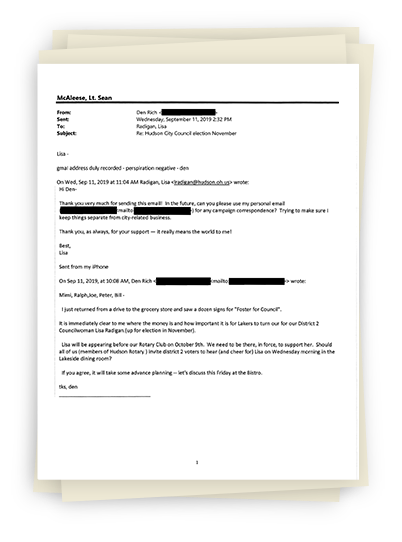
Councilwoman Radigan again reminds a supporter to use her personal email.
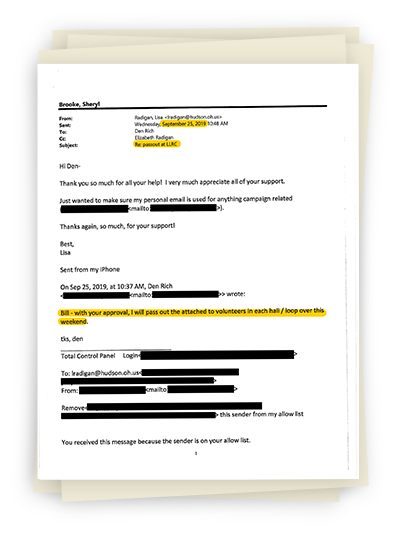
Councilwoman Radigan reminds a supporter to use her personal email "for anything related to the campaign."
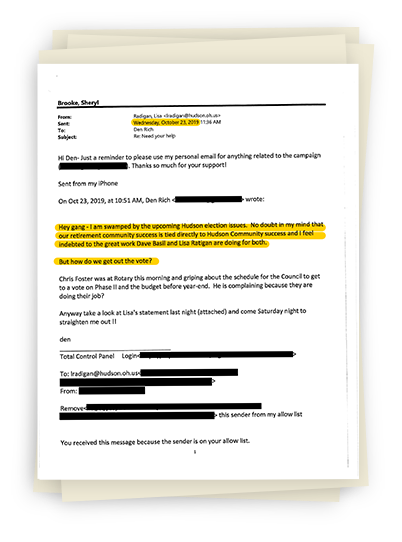
Week 8 – Hudson Hub Times article reports on impact of The Hudson Files.
In a July 29, 2020 Hudson Hub Times story titled, Hudson mayor asks state to investigate council president’s email, The Hudson Files was referenced as a source for public records and a website which aims to “increase transparency and accountability in Hudson’s municipal government.”
The specific emails referenced in the article are those of Council President Bill Wooldredge, who, over the course of many months, used his taxpayer funded email account to support candidates for council and conduct other political activity in an apparent conflict with city policies and accepted ethical standards. According to the Hub Times article, Wooldredge has denied any wrongdoing.
By contrast, former Ward 2 Hudson City Councilwoman Lisa Radigan, a lawyer and chief ethics and compliance officer for a major multinational company headquartered in North Canton, repeatedly directed emails containing campaign or political information to her personal email account. By doing so, Radigan followed Hudson’s IT policies, as contained in its Handbook for City Council, as well the code of ethics published by the American Society for Public Administration.
You can read Radigan’s emails here.
Read this week's THF press release.
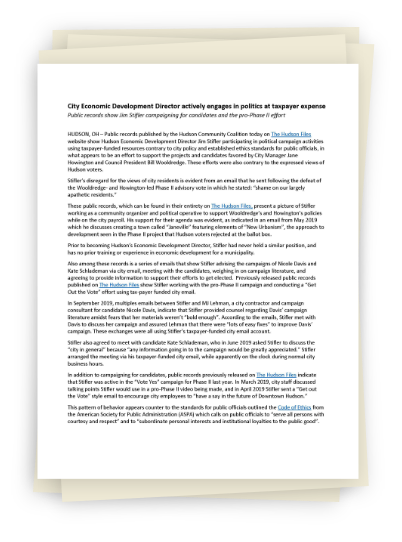
Stifler promises to provide feedback for candidate Nicole Davis’ campaign literature using taxpayer funded email.
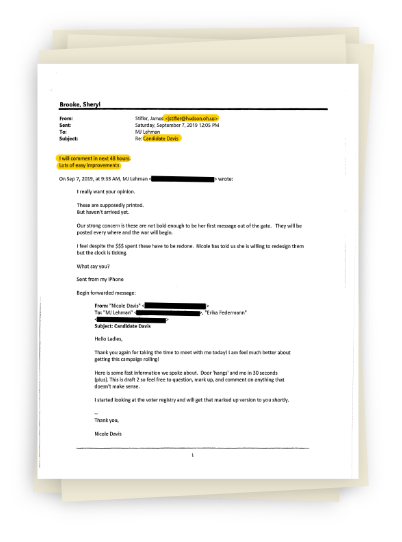
Stifler receives campaign literature and updates from city vendor and campaign consultant MJ Lehman.
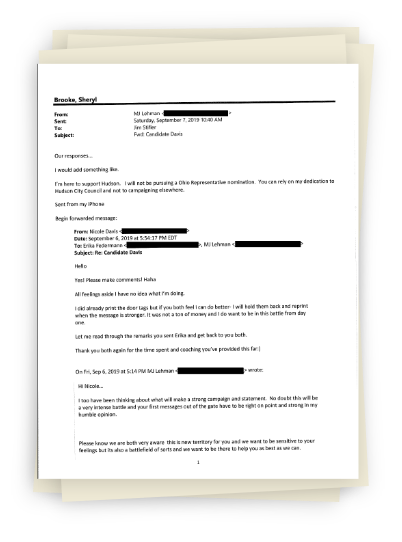
Stifler meets with candidate Nicole Davis and signals that he will advise on her campaign literature via his taxpayer funded email, during city business hours.
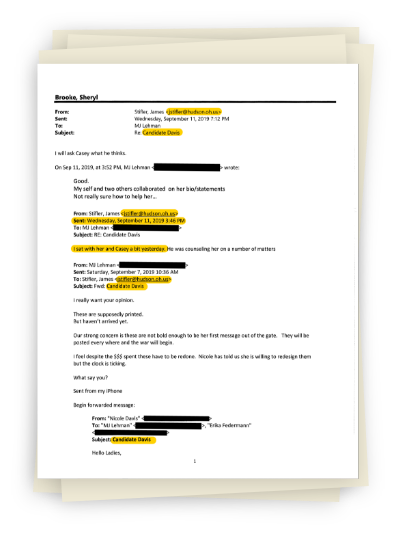
Stifler shares his passion for New Urbanism, discusses a city planning philosophy that could fundamentally change Hudson’s historic footprint and the potential for creating “Janeville”
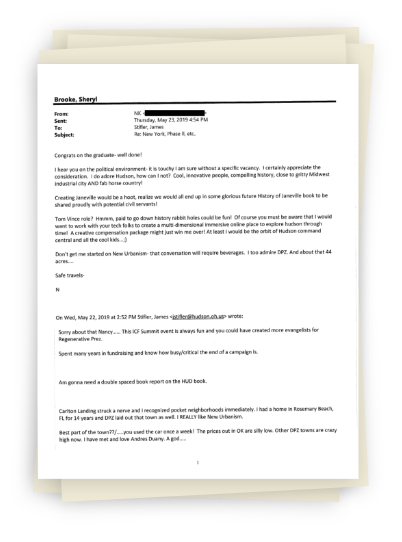
Stifler sets meeting via taxpayer funded email with candidate Kate Schlademan to provide information for her campaign.
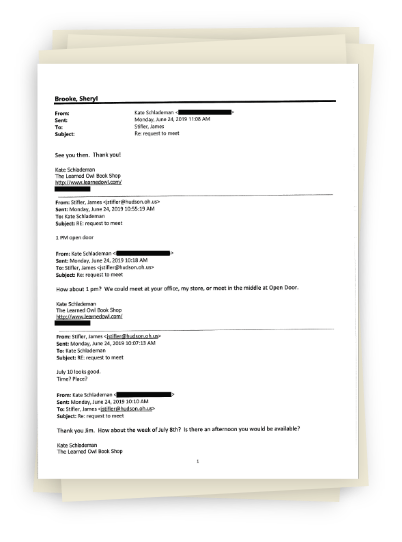
Following the defeat of the vote on Phase II, Stifler states: “shame on our largely apathetic residents”
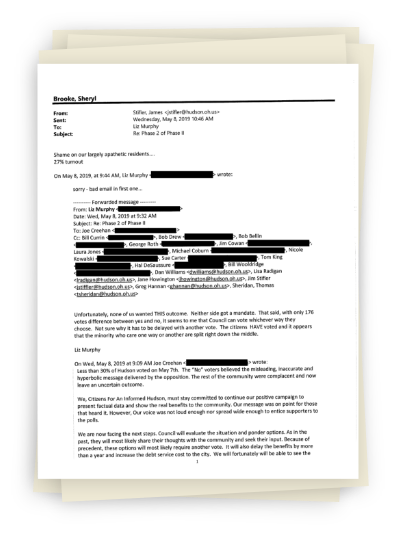
Week 7 – Misuse of City Resources by City Economic Development Director Jim Stifler
Hudson Economic Development Director Jim Stifler acts like a political operative, campaigning for candidates using taxpayer-funded resources, and pushing a New-Urbanism agenda while writing “shame on our largely apathetic residents” after the Phase II advisory vote was defeated last year. Prior to becoming Hudson's Economic Development Director, Stiffler had never held a similar position, and has no prior training or experience in economic development for a municipality.
Read this week's THF press release.
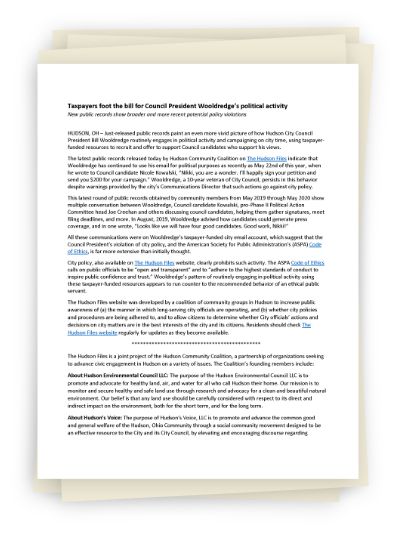
Bill Wooldredge offering to donate $200 to Nicole Kowalski on his taxpayer-funded email.
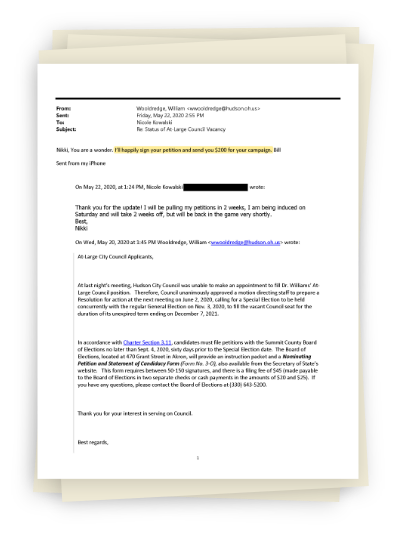
Bill Wooldredge, Nicole Kowalski, and state Rep. Weinstein discussing a fundraiser on Wooldredge’s taxpayer-funded email.
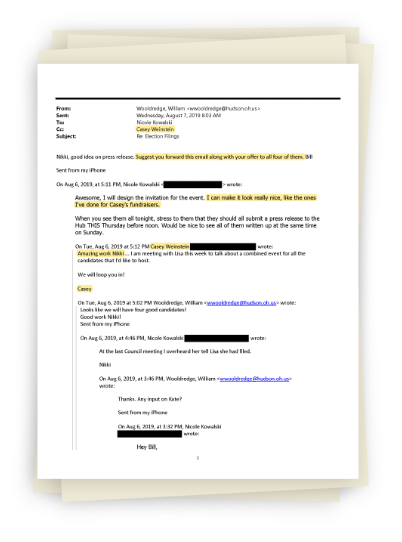
Bill Wooldredge telling Nicole Kowalski that they need to discuss council races.
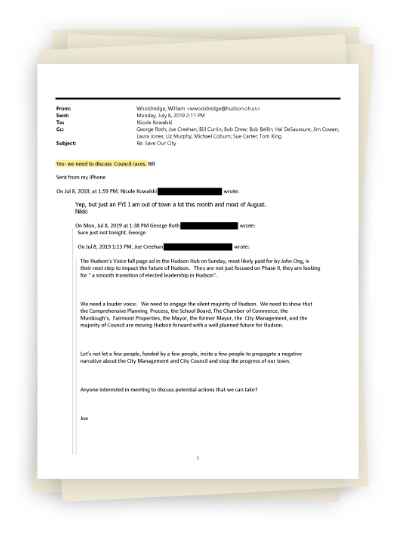
Bill Wooldredge, Nicole Kowalski, and others discussing election complaints.
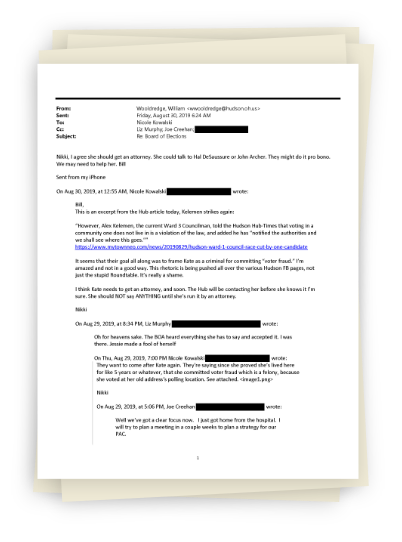
Bill Wooldredge and Nicole Kowalski discussing campaign petitions on his taxpayer-funded email.
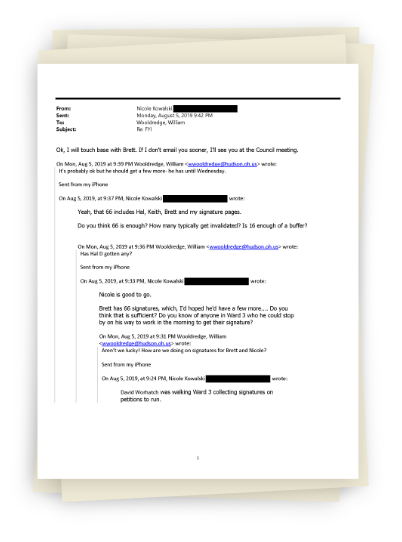
Nicole Kowalski encouraging Bill Wooldredge to speak with David Basil and Lisa Radigan about their campaigns.
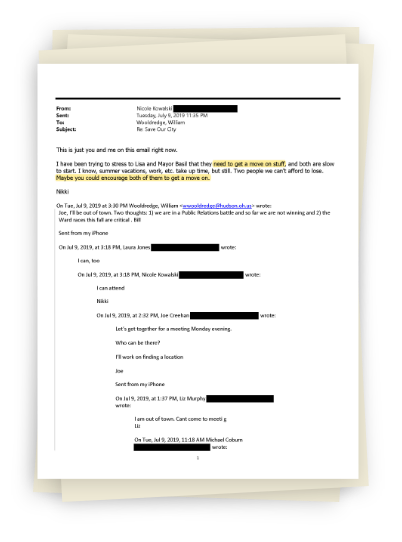
Nicole Kowalski informing Bill Wooldredge that she is trying to recruit a candidate against Beth Bigham.
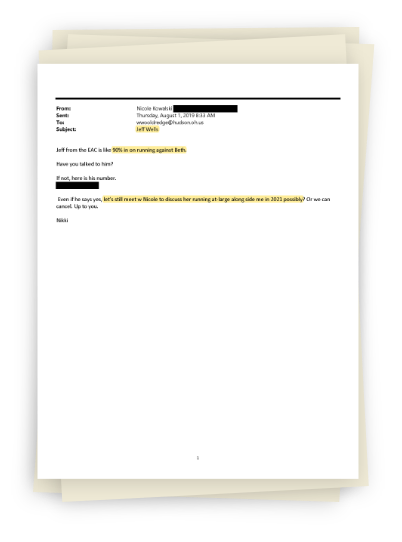
Nicole Kowalski informing Bill Wooldredge that her candidate had declined.
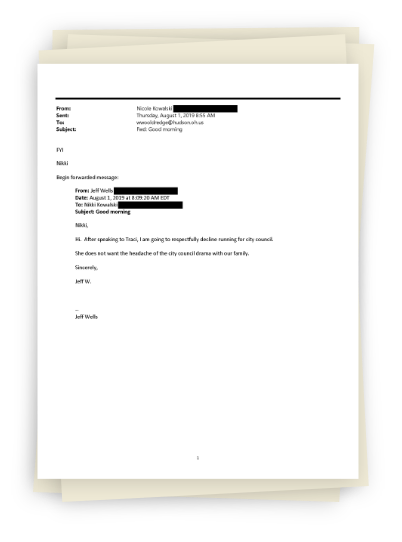
Nicole Kowalski and Bill Wooldredge scheduling a meeting with Nicole Davis to discuss her candidacy, on his taxpayer-funded email.
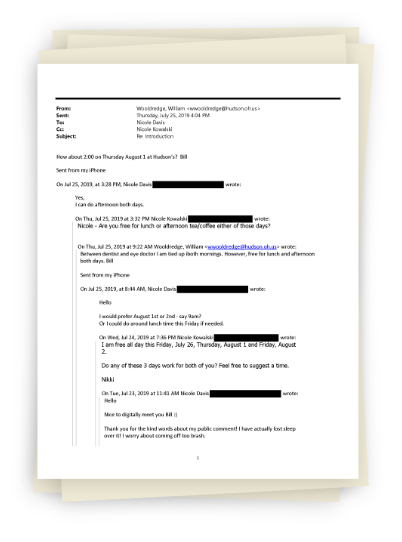
Bill Wooldredge receiving ‘perspective’ about the advisory election results from the pro-Phase II PAC leaders.
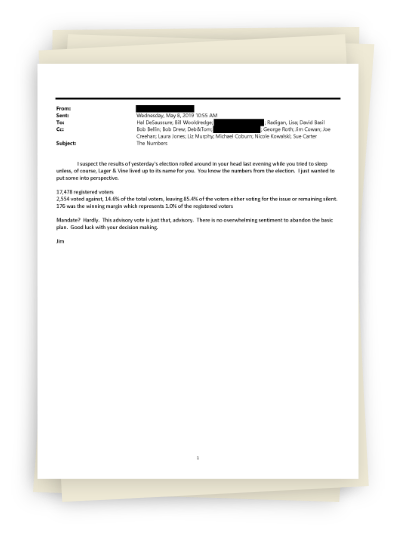
Bill Wooldredge receiving information about pro-Phase II PAC election night party on his taxpayer-funded email.
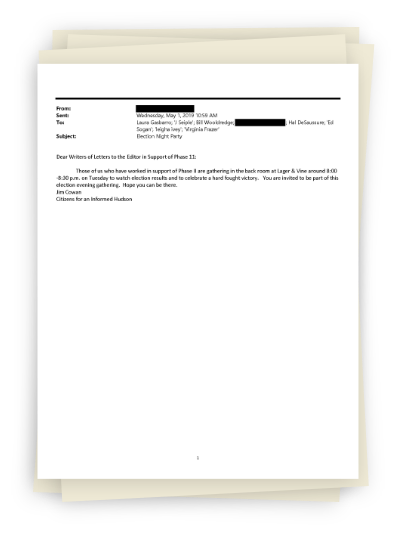
Week 6 – Bill Wooldredge and Nicole Kowalski, Part 2
Newly released public records show that Hudson City Council President Bill Wooldredge continues to routinely engage in political activity and campaigning using taxpayer-funded resources. Emails document numerous conversations about recruiting and support for political candidates between Wooldredge and political operative Nicole Kowalski.
Howington stating that she supports a city council candidate running against an incumbent member of council.
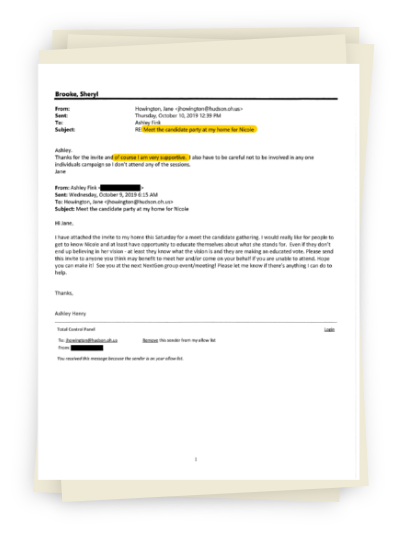
Howington acting dismissively towards Architecture Board member Chris Bach.
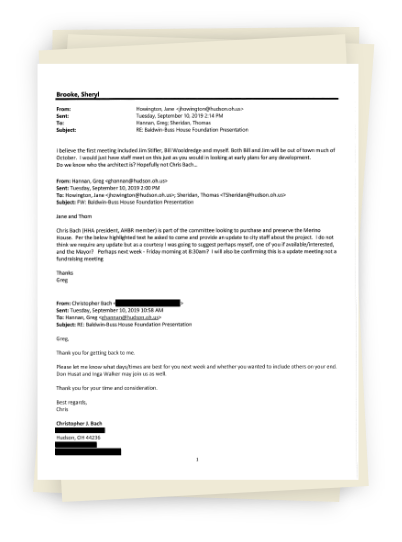
Howington offering to bend her normal protocol about appearing at forums during campaign season to support a candidate.
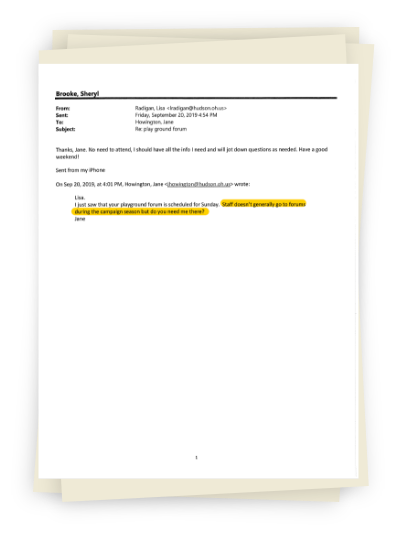
Howington coordinating with pro-Phase II campaign to try to get anti-Phase II videos taken off the internet.
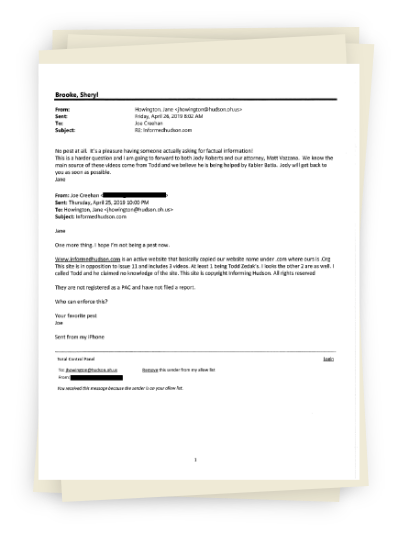
Howington making dismissive comments about Council Member Beth Bigham and State Sen. Kristina Roegner.
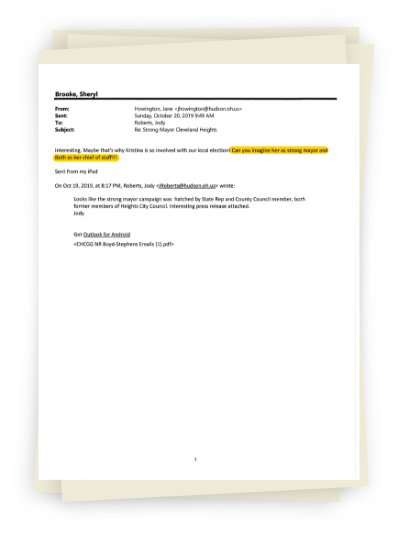
Howington making dismissive comments to a city contractor about a bill sponsored by state Sen. Kristina Roegner.
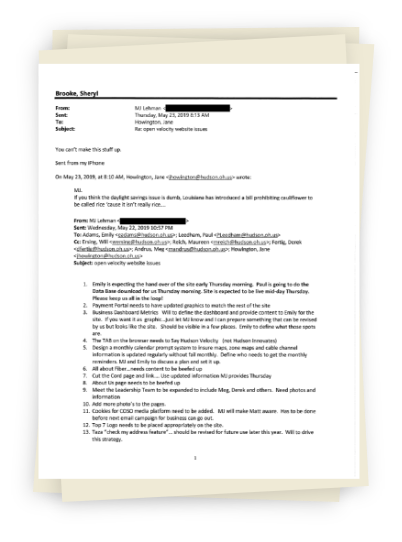
Week 5 – Emails by City Manager Jane Howington Potentially Violate Her Code of Ethics
City Manager Jane Howington regularly engages in political activity on the clock and in disparaging other public officials and residents, according to emails provided by the City of Hudson. This type of behavior is also exhibited by her subordinates on a regular basis. This type of activity undermines public trust and is likely in violation of the Code of Ethics issued by the International County and City Managers Association (ICMA), of which Howington is an active member.
The city’s contract with Hennes Communications
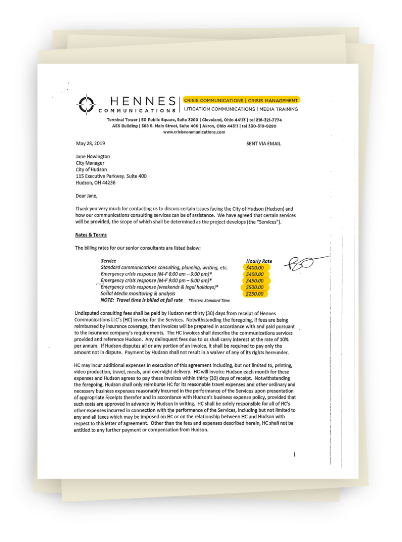
City strategic communication plan proposal developed by Hennes
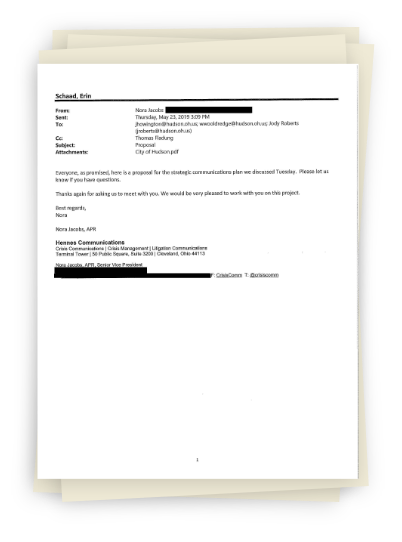
Communications Director Jody Roberts’ spreadsheet about the anti-Phase II campaign
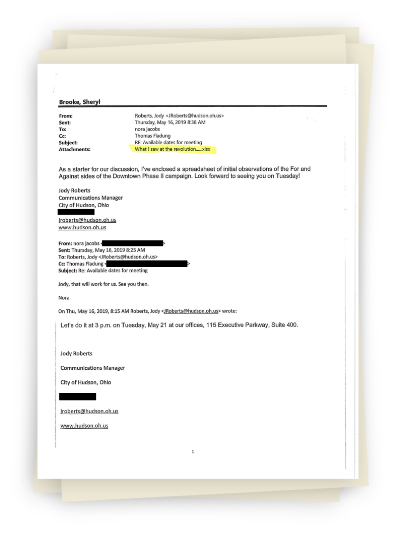
City Manager asks for help in responding to "anti-everything" group
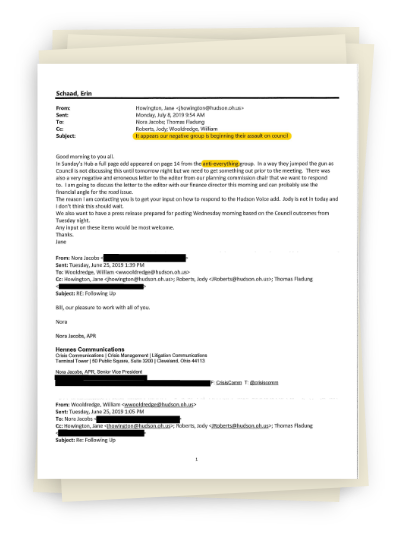
City staff predicts "anti-group" will get worse for November election
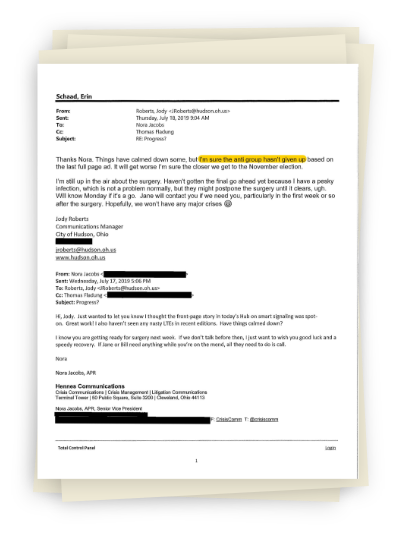
Talking points about city issues developed by Hennes
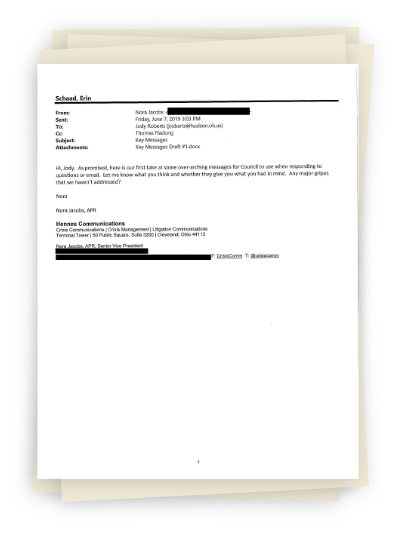
Hennes Invoice for February 2020
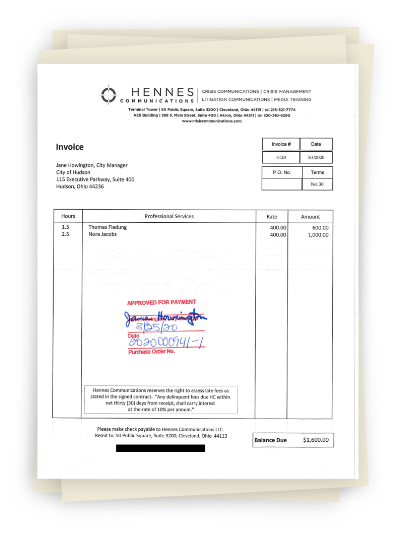
Hennes Invoice for March 2020
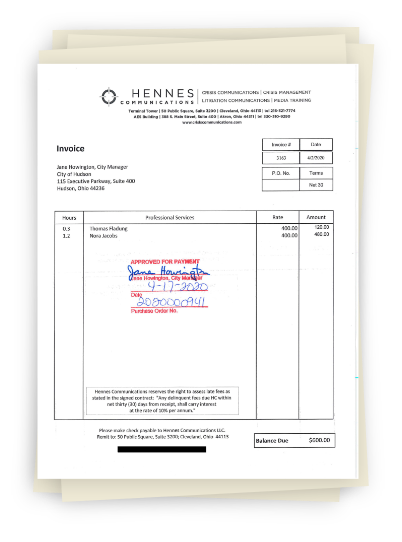
Week 4 – City hires costly crisis management firm to convince residents to back Phase II.
After voters rejected the Phase II development project, The City retained a ‘crisis management’ firm to convince residents that the City’s vision for the future, including the Phase II development, was the right vision, regardless of the viewpoints and concerns citizens have. These records do not indicate any interest in seeking input from Hudson residents on the City’s plan or the future of Hudson. The PR firm charges up to $500 PER HOUR.
The City Handbook explicitly states that the City shall not use its resources “to influence the outcome of elections” for local ballot measures.
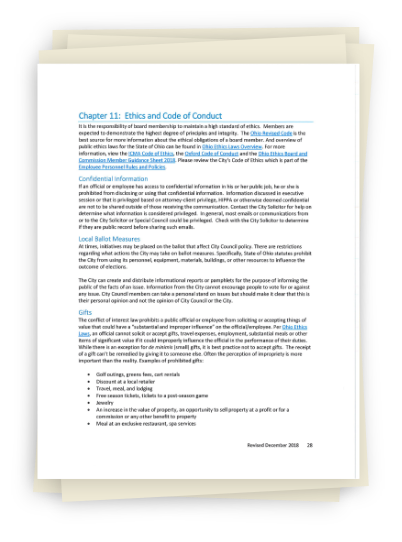
The city spent at least $4,000 of taxpayer funds on an “educational campaign” to try to get around the ban on city resources.
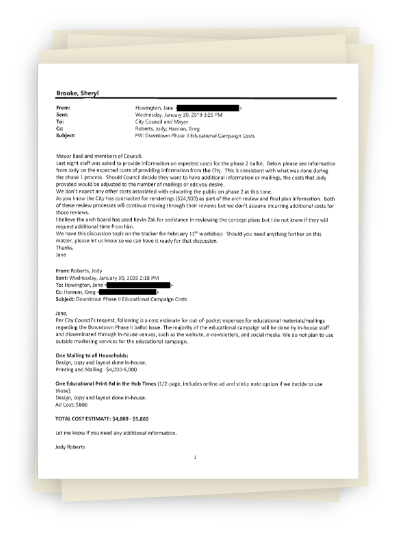
The city intentionally split messaging tasks with the pro-Phase II group behind the scenes, without taxpayers knowing.
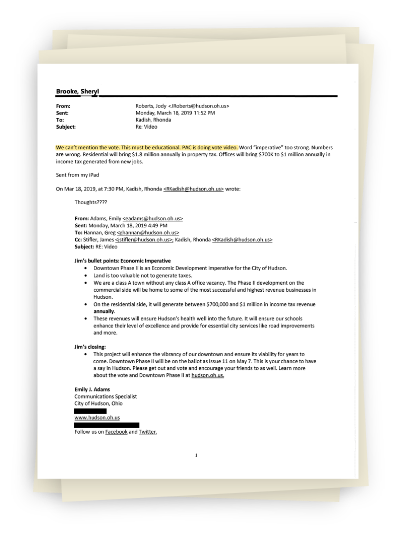
Using city resources to help yard sign distribution for the pro-Phase II PAC.
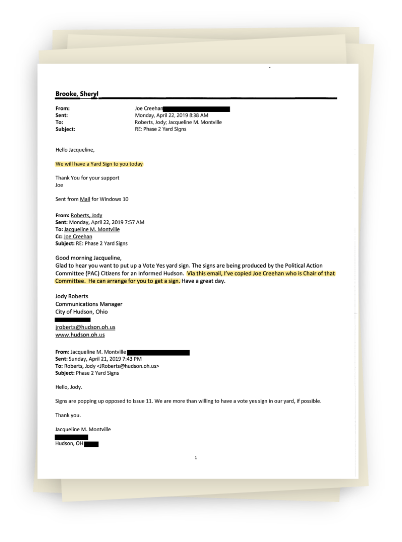
Using city resources to help secure yard sign locations for the pro-Phase II campaign.
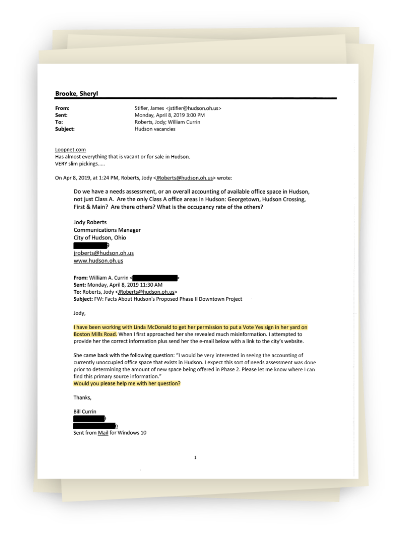
City manager Jane Howington discussing pro-Phase II ads.
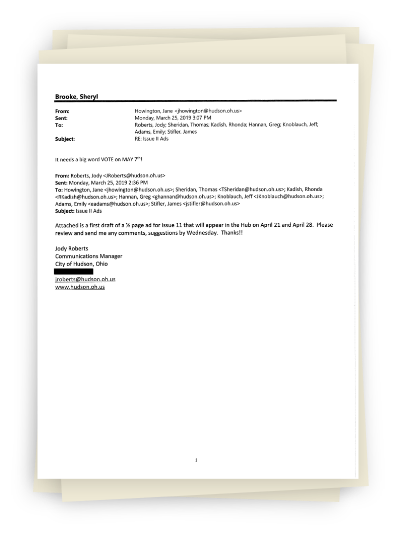
Economic development director Jim Stifler emailing city employees that live in Hudson to go vote, on their official city emails.
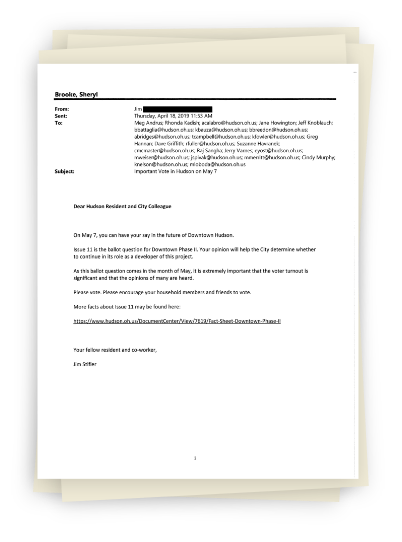
City officials discussing campaign literature on the city emails.
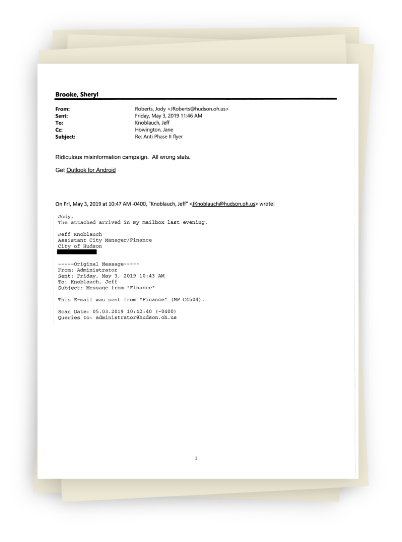
The city helping pro-Phase II voters get absentee ballots.
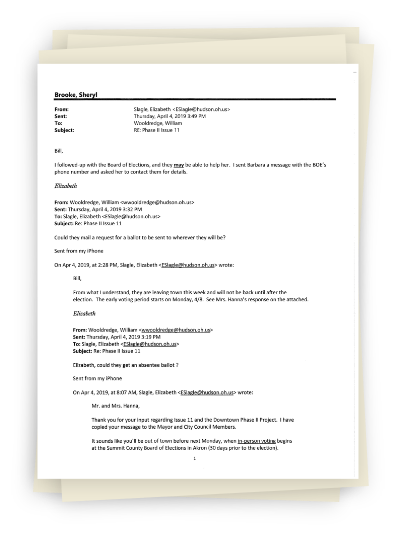
Pro-Phase II PAC leaders communicating with city officials after election defeat.
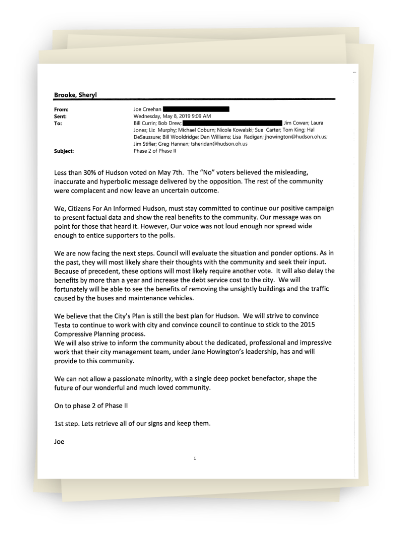
Week 3 – City Hall using taxpayer dollars to support the pro-Phase II campaign in May of 2019.
Despite a city policy that prohibits the use of city resources to support campaigns, city employees coordinated with the pro-Phase II political campaign to distribute yard signs, help voters access absentee ballots, and discussed campaign literature and advertisements, in an effort to encourage residents to vote for the Phase II development.
Hudson’s IT policies against political and personal email use.
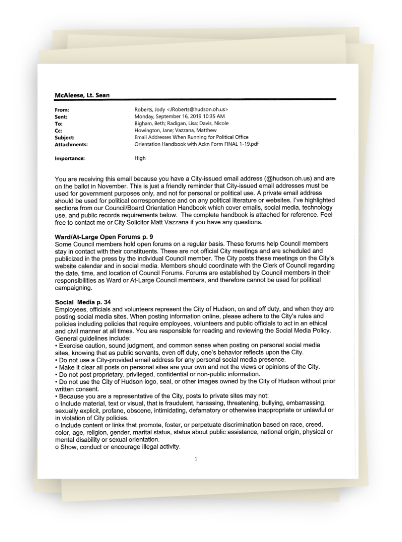
Wooldredge, on his city email, agreeing to help Nicole Davis’ campaign.
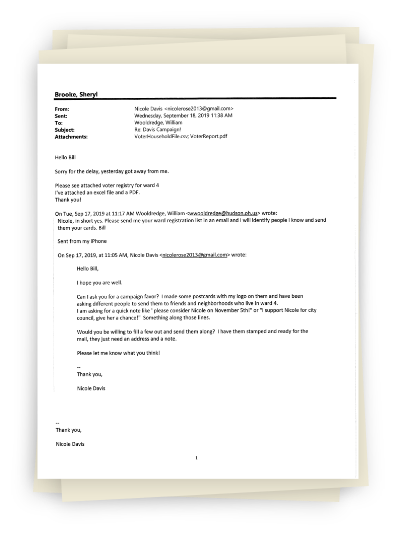
Wooldredge, on his city email, discussing recruiting candidates.
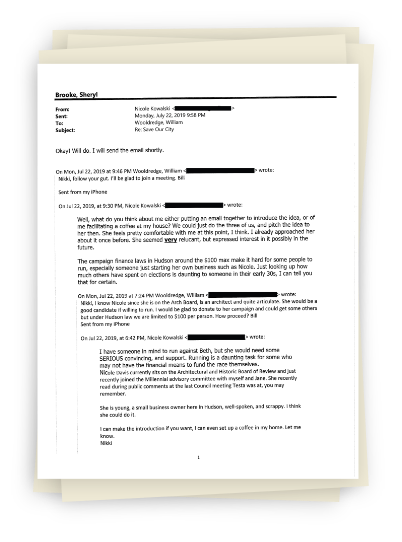
Wooldredge, on his city email, recruiting Nicole Davis with Nicole Kowalski.
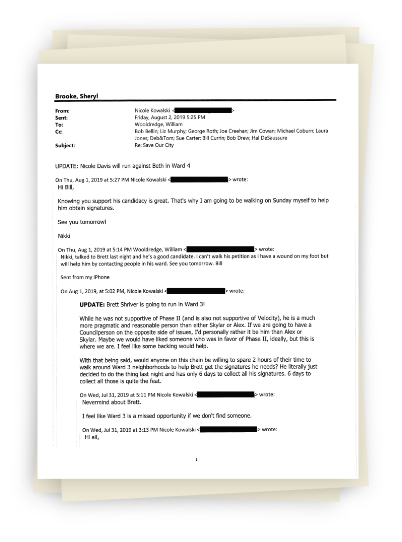
Wooldredge, on his city email, receiving Phase II election update.
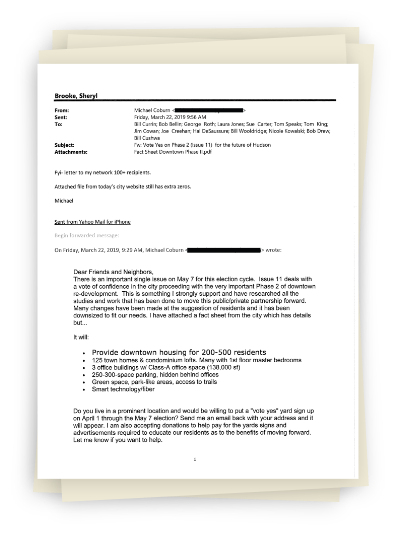
Wooldredge, to Jane Howington, dismissing concerns over Phase II.
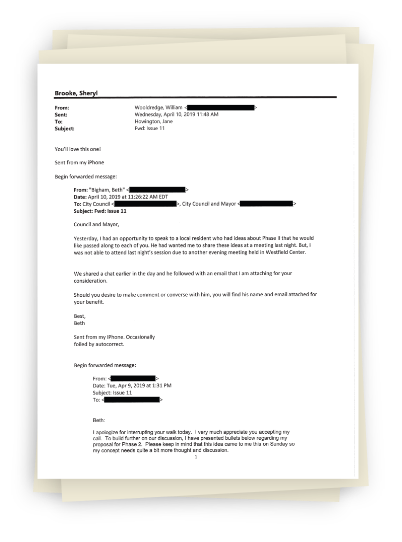
Wooldredge, on his city email, comparing Phase II election results.
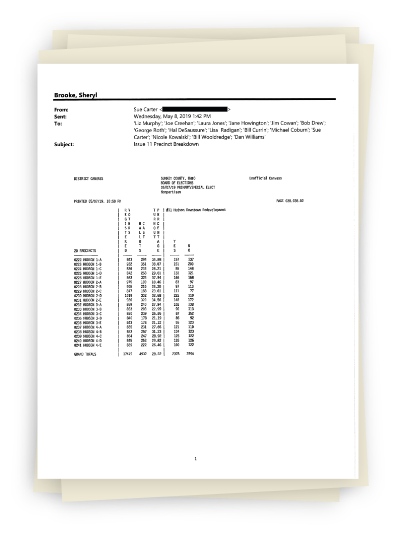
Wooldredge, on his city email, with a group discussing the upcoming council elections.
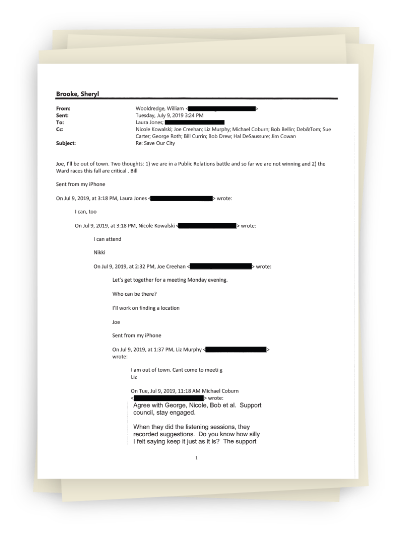
Wooldredge, on his city email, group conversation continued.
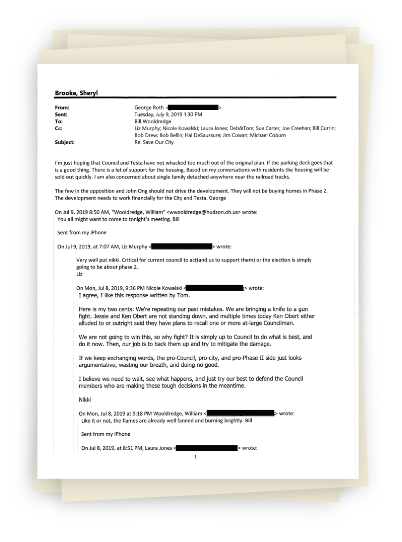
Wooldredge and the group discuss “discrediting” the other side.
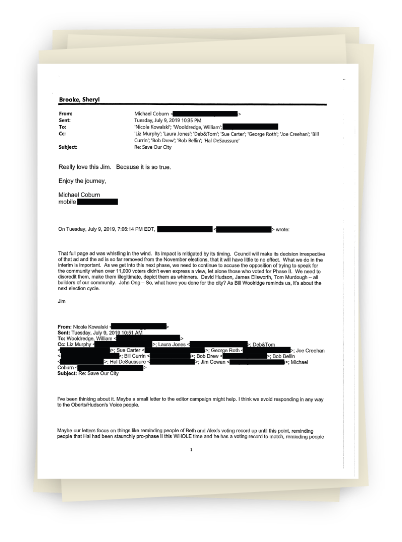
Wooldredge, on his city email, getting updates about Beth Bigham from Nicole Kowalski.
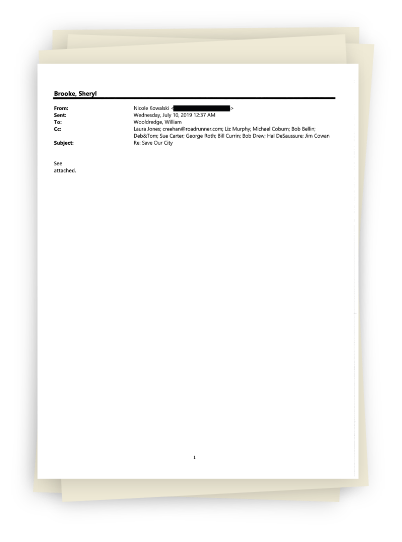
Wooldredge, on his city email, receiving more updates about candidate recruitment.
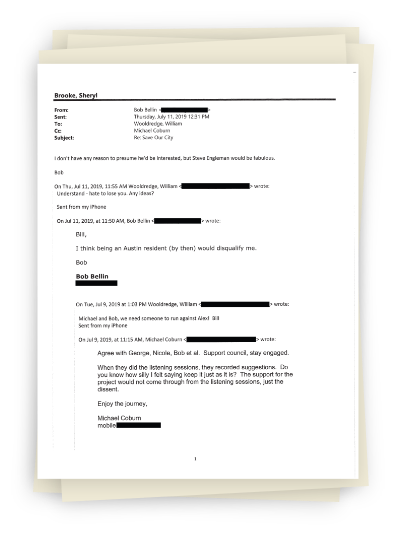
Wooldredge, on his city email, discussing Nicole Kowalski’s candidate recruitment efforts.
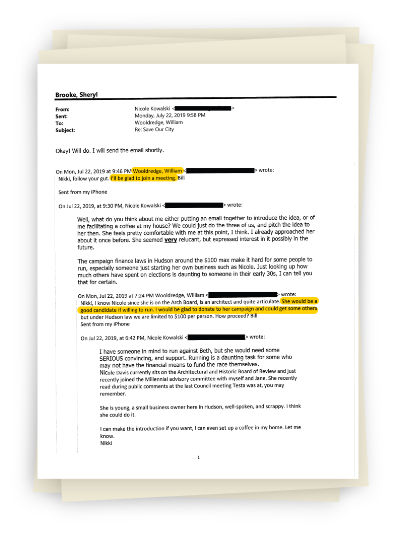
Wooldredge, on his city email, receiving updates on the Board of Elections challenges.
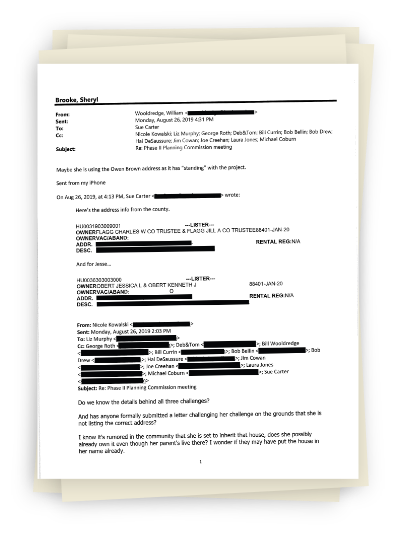
Wooldredge on his city email, receiving more updates on the challenges.
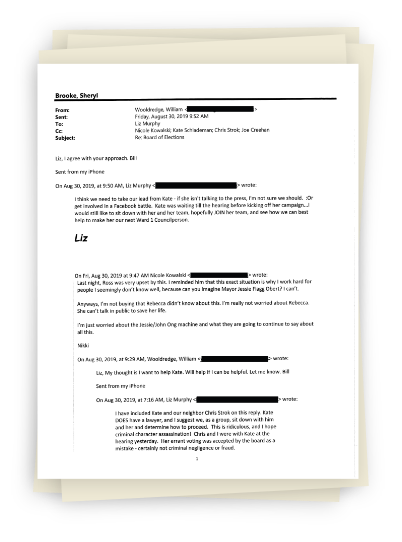
Wooldredge discussing the Board of Elections response on his city email.
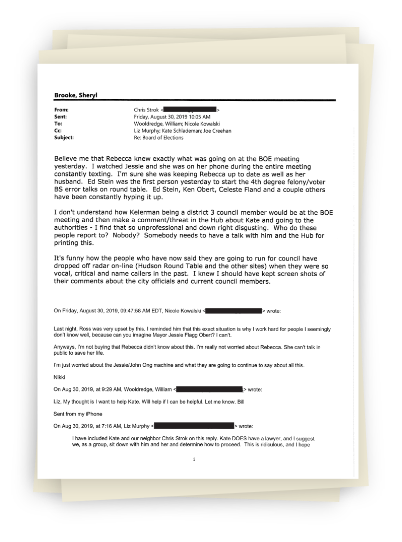
Wooldredge endorsing Kate Schlademan on his city email and discussing his financial contribution.
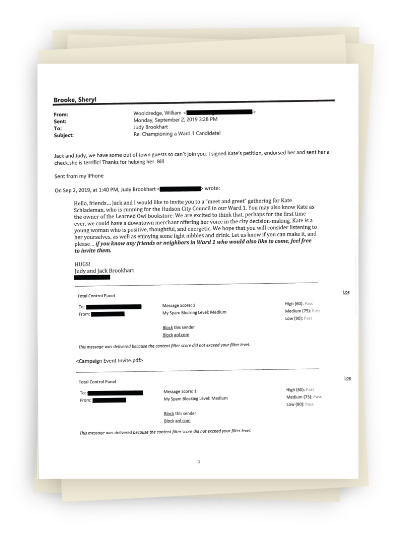
Wooldredge receiving a thank you on his city email about his political donation.
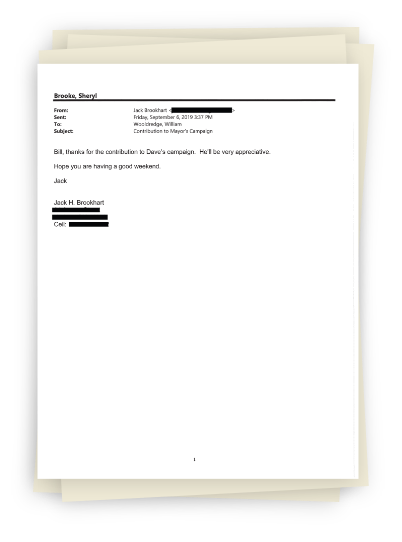
Wooldredge, belatedly telling someone to use his personal email for unofficial business.
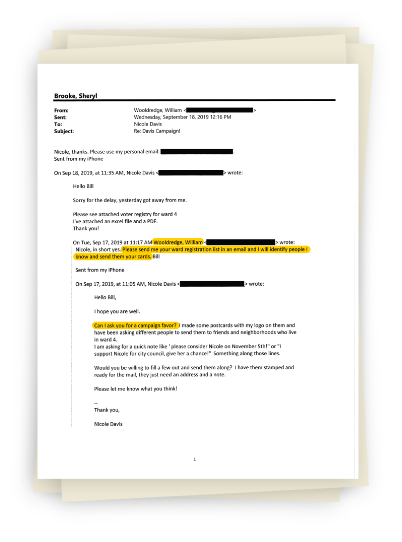
Wooldredge, conducting personal business on his official email.
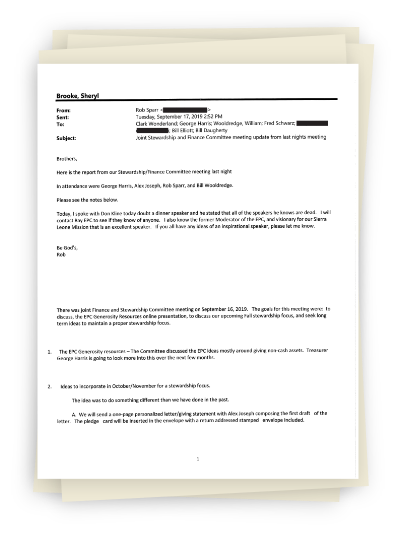
Week 2 - Misuse of City Resources Violates City Policy
A series of emails sent to and from Council President Bill Wooldredge show a pattern of political campaigning using taxpayer-funded city resources, as well as misuse of these resources for personal purposes. The City of Hudson has a policy against such activities.
Click Here to Read The Environmental Summary
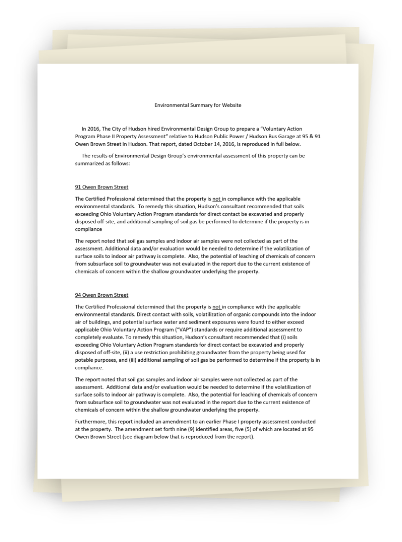
Click Here to Read The Testa MOU
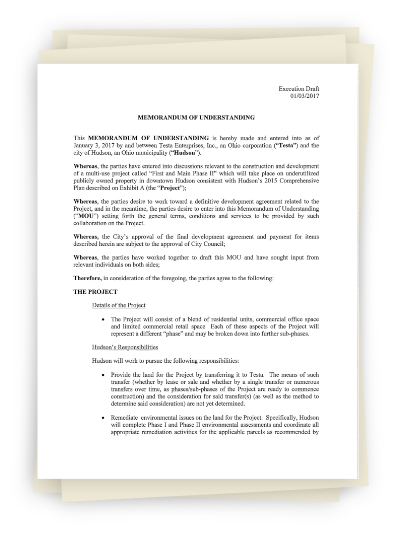
Click Here to Read the Soil Contamination Report
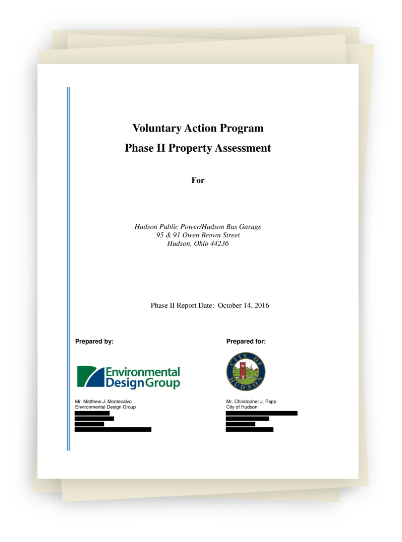
Click Here to Read the YDC Soil Swap Proposal
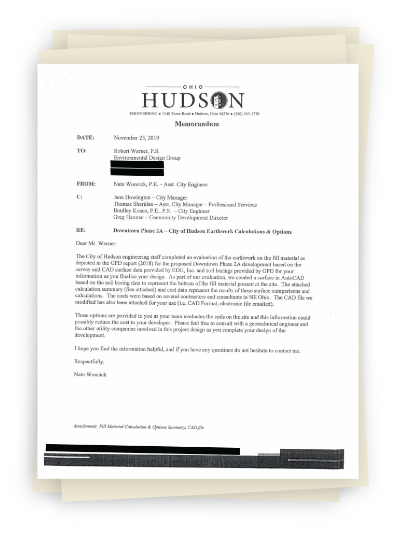
Click Here to Read About the History of Phase II
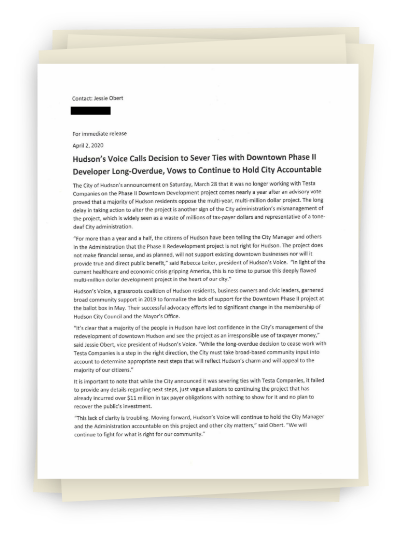
Click Here to Read Testa's legal response
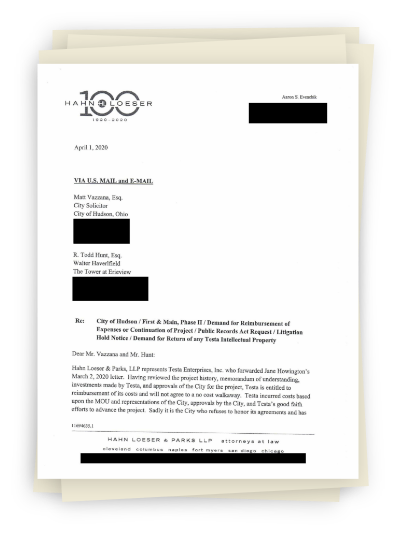
Week 1 - Phase II
Throughout the Phase II debate, the city hid the fact that the proposed Phase II site contained soil contamination that would potentially have required hundreds of thousands of dollars in clean up and swapping out soil from the Phase II location with soil from the former Youth Development Center property.
